
March 2023
Solihull Housing Strategy
Making Solihull a great place to live for all
2023-2032
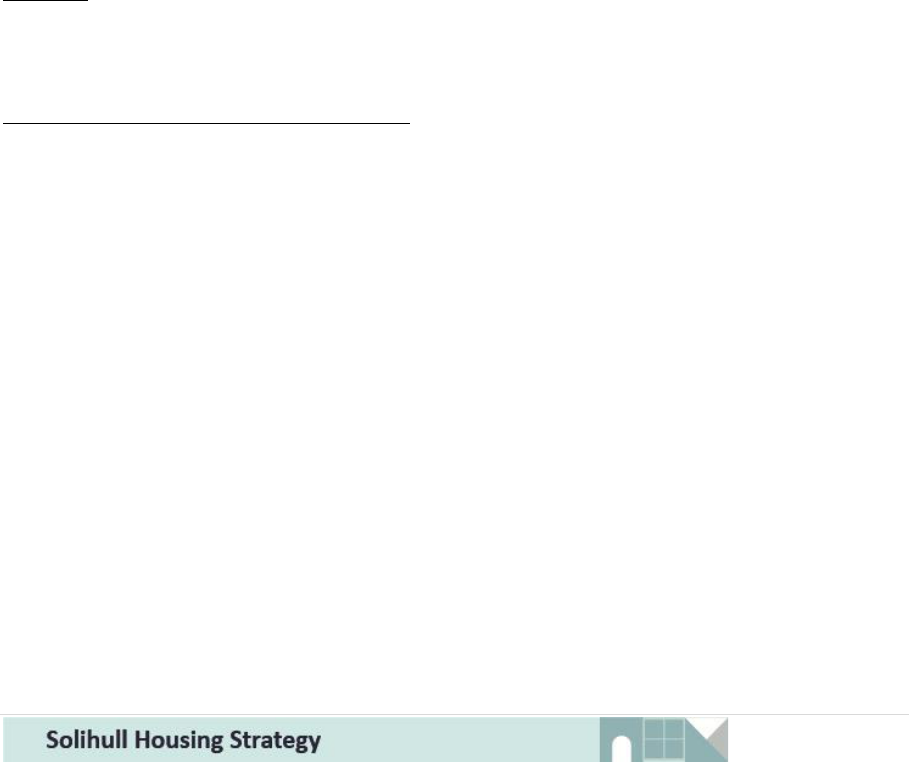
ii | P a g e
Solihull Housing Strategy 2023 - 2032
Contents
Foreword
Plan on a Page
1. Introduction and Purpose .................................................................................................................. 1
2. Solihull's Strategic Context.................................................................................................................. 2
3. Building Thriving Communities and Wellbeing .................................................................................. 8
4. Making Best Use of Existing Housing ............................................................................................... 13
5. Tackling Climate Change .................................................................................................................. 20
6. Meeting the Housing Needs of Older People .................................................................................. 26
7. Helping People with Additional Support Needs .............................................................................. 32
8. Meeting Local Housing Needs Through New Development ............................................................ 39
9. Implementing the Housing Strategy ................................................................................................ 43
Appendix
1. Jargon Buster .................................................................................................................................... 46
Supporting Documents (separate documents)
1. Implementation Plan, 2023 - 2025
2. Health Equalities Assessment Tool
3. Housing Data Dashboard
4. Fair Treatment Assessment

iii | P a g e
Foreword
It gives me great pleasure to present Solihull’s Housing Strategy.
Solihull is a great place to live. Our Borough provides a good range of housing, an attractive
environment, a strong economy and is well connected with excellent schools and local services.
Housing is very important to our quality of life, prosperity, health, and wellbeing. It is also an
essential part of helping to tackle inequality and enabling communities to thrive. New houses and
apartments are significant in creating a sense of place and ensuring that we meet our Climate
Change Declaration to achieve net zero carbon in Solihull by 2041.
We are delivering on our housing agenda and doing many things well, but there remains much to do.
Over the next ten years Solihull faces both exciting opportunities and important challenges. This
Strategy sits alongside a wide range of Council strategies and plans that together help implement the
Council Plan and realise our vision of ‘opportunity for all’.
The Housing Strategy sets out our housing ambition across a wide range of areas. Solihull Council has
a central role in the local housing market, acting as influencer, investor, provider and regulator. But
the Council cannot do it all and we rely on a wide range of partnerships to deliver our shared
ambitions. Partnerships take many forms, and we are committed to working with private and public
providers, parish and town councils and the community and voluntary sector to ensure the best
possible housing outcomes for the people of Solihull.
I commend this Strategy to you. We look forward to working with you.
Councillor Andy Mackiewicz, Cabinet Member Climate Change, Planning & Housing
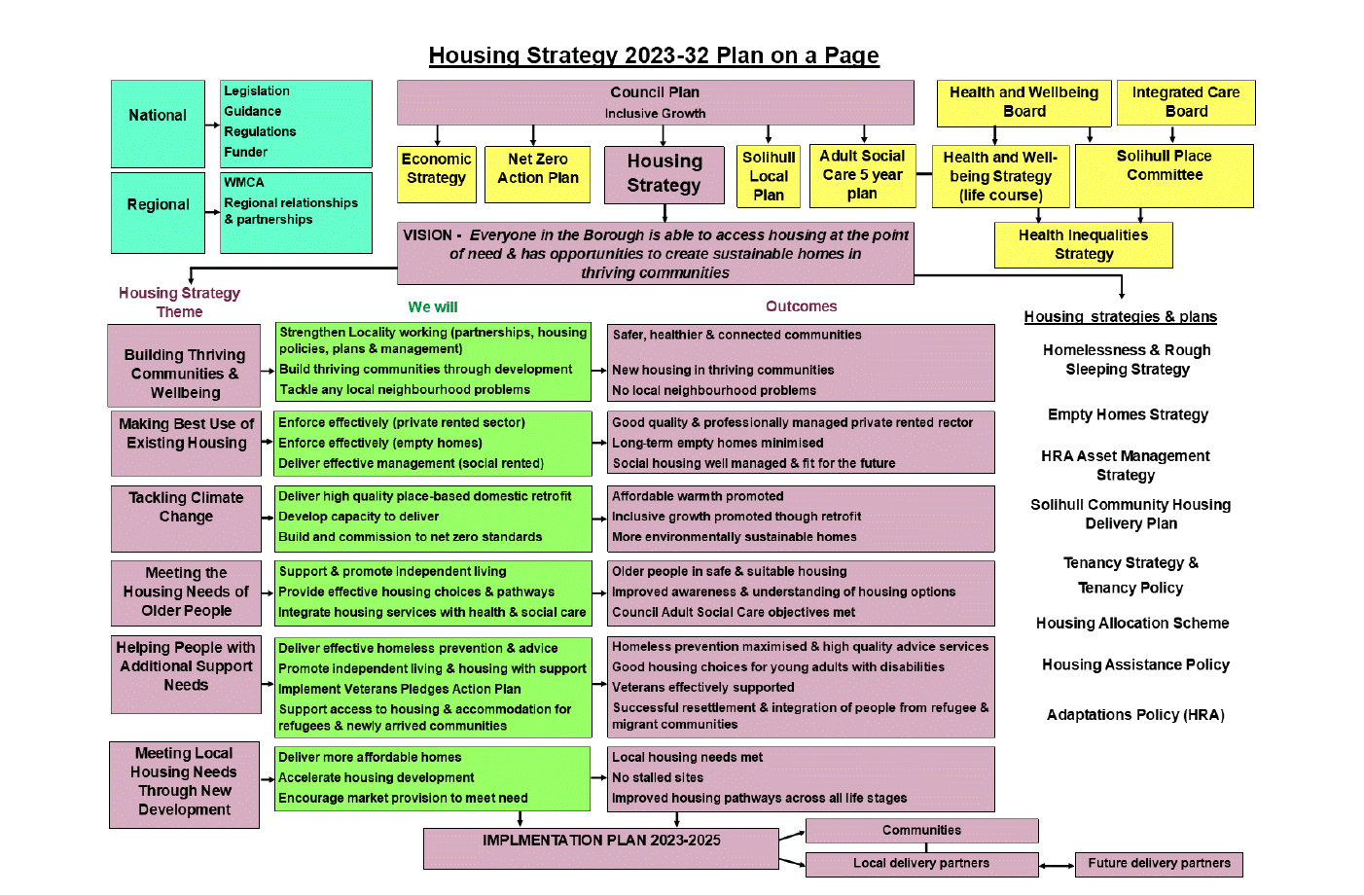

1 | P a g e
1. Introduction and Purpose
1.1 This Housing Strategy sets out the Council’s housing vision and ambitions for the 10-year period
to the end of 2032. An Implementation Plan, the first covering the 3-year period 2023 - 2025, sets
out specific priorities, activities and outcomes.
1.2 The Council’s vision is that,
“Everyone in the Borough is able to access housing at the point of need and has opportunities to
create sustainable homes in thriving communities”.
1.3 This Strategy and Implementation Plan works with a number of other plans and strategies
towards an outcome where everyone has a home that is safe, secure, affordable, accessible and
suitable and is able to make a positive contribution to climate change. Tackling inequalities and
improving health outcomes are of particular importance and each part of the Strategy makes a
positive difference to these.
1.4 Housing is everybody’s business. For most people in the Borough, the housing market works well
but for some this is not the case. People on lower incomes and who might be considered vulnerable
may need longer-term help, whilst other people may need help at points of crisis or at different
stages of the life course.
1.5 Delivering effective housing plans requires excellent partnership working at many different
levels. By clearly setting out the Council’s vision and ambitions this Housing Strategy aims to provide
a common and shared reference point, which can facilitate partnership working and help all
stakeholders to maximise the contribution housing can make to wider objectives.
1.6 The Council has a broad housing role acting as investor, provider, enabler, regulator and
enforcer. The Council also has an important leadership role in the local system to convene, advise,
support and influence stakeholders with a role or interest in housing. We will use our networks,
influence and expertise to help build partnerships and address local housing challenges. We will use
our legal powers, finance, land and expertise to help create a housing market that works well for all
and achieve our housing vision.
1.7 Realising this vision requires excellent standards of management, effective housing policies and
capital investment programmes, as well as new housing development and infrastructure. These
must all integrate with the Council’s wider social, economic and environmental responsibilities and
priorities, such as safeguarding, care and support, public health, neighbourhood management, skills
and work and progressing towards net zero carbon.
1.8 The approach of this Strategy is therefore both cross-sector and cross-tenure with the intention
that housing policies are cohesive and complement other plans and strategies. The Strategy has
been arranged in a thematic way but delivery against one theme also contributes to others.
1.9 The main audience of this Strategy is the wide range of partners who we work alongside, elected
members of Solihull Council and senior officers.

2 | P a g e
2. Solihull’s Strategic Context
1. Local
Population and Housing
2.1 In the period to 2030 the population of Solihull is forecast to increase from 217,700 to 230,400.
There will be more smaller households, a continued growth of the older person population and in
the number of people with disabilities. The population will be more diverse.
2.2 The number of homes is projected to increase from 93,643 to 102,800. Housing growth will see
existing residential areas grow and the new ones develop.
2.3 Solihull has important housing challenges. In most cases these are inter-related and addressing
one challenge will have benefits for another. These challenges are set out in more detail in sections
3 – 8 but centre on,
1. Delivering excellent housing services in a way that delivers a strong sense of ‘place’ and
contributes to improving wider health and wellbeing outcomes
2. Making the best use of the Borough’s housing, across all tenures. There is a need to
ensure that the social and private housing sectors are of high quality and that the number of
empty homes in all tenures is minimised
3. Tackling climate change. The retrofit of privately owned and socially rented homes to
improve their environmental performance is a significant challenge to help tackle both
climate change and fuel poverty
4. Enabling good housing and care choices and pathways for older people. It is important
that all older people have a good range of housing with care and support options. Not all
older people need specialist accommodation; many will prefer to remain in their own homes
or downsize to a smaller property
5. Helping people with additional support needs. People may require additional short-term
support, and some may need longer-term support. There is a need to prevent crisis
wherever possible, but where crisis does occur, to respond effectively
6. Addressing the affordability of housing. House prices are comparatively high, and this
makes it hard for young people and other newly forming households on average salaries to
afford to buy in Solihull. There is also an acute shortage of social rented homes to meet
homelessness and housing waiting list pressures.
2.4 There are existing local, regional and national factors which have a positive impact on the
Council’s housing aspirations. In other cases, there can be adverse impacts and it is important that
the Housing Strategy helps to mitigate this.

3 | P a g e
Local Strategies and Plans
2.5 There are a number of Council strategies and plans that have an important relationship to the
Housing Strategy.
Council Plan, 2020-2025
2.6 The Solihull Council Plan sets a vision ‘where everyone has an equal chance to be healthier,
happier, safer and more prosperous through growth that creates opportunities for all’.
2.7 The basis of the Plan is that economic development, environmental sustainability and health and
well-being must move forward together so that sustainable inclusive economic growth and
opportunity for all can be realised.
2.8 Inclusive Growth is central to the Council Plan and how the Council does its business. There are
many projects and partnerships that contribute to the Council’s inclusive growth ambitions, and
these are delivered and governed through a range of existing structures. An Inclusive Growth
Programme covers areas of work that are not part of established programmes to add value to
existing activities and help take forward the inclusive growth agenda.
2.9 The Council is committed to driving inclusive growth through its role as employer, procurer,
service provider and system influencer. Through building social value into our activities, we can drive
greater benefits for the community. Our approach to Inclusive Growth directly aligns with the
Government’s levelling up agenda, which presents the opportunity for us to do more. An Inclusive
Growth Outcomes Framework has been developed that will allow progress to be monitored. The
outcomes relate to people and communities, economy and environment.
2.10 The Council Plan identifies several priorities where housing plays a significant role,
Increase the supply of affordable and social housing that is environmentally sustainable
Take action to improve life chances and health outcomes in our most disadvantaged
communities
Enhancing the natural environment by reducing net carbon emissions
Improving outcomes for children and young people in Solihull
Good quality, responsive, dignified care and support for adults in Solihull when they need it.
Solihull Health and Wellbeing Strategy, 2019-2022
2.11 The ‘wider determinants of health’ recognises that a wide range of social, economic and
environmental factors can impact on an individual’s health. Housing is one of these.
2.12 The Solihull Health and Wellbeing Strategy 2019-2022 is based on a ‘life course’ approach. The
Strategy identifies the three priority areas of ‘Maternity, Childhood and Adolescence’, ‘Adulthood
and Work’ and ‘Ageing and Later Life’. A fourth all age priority is ‘social connectedness’. Regarding
its affordability, condition, suitability and security, housing can positively contribute to each of these
priorities.
Tackling Health Inequalities: A Blueprint for Solihull, 2022-2025
2.13 Overall, Solihull is relatively affluent but there are marked inequalities in income levels, health
and life expectancy. The Health Inequalities Strategy seeks to address this.

4 | P a g e
2.14 Health inequalities exist between different socio-economic groups, geographies and across the
nine equality and diversity groups that are protected in law.
1
For socially excluded and vulnerable
groups such as people experiencing homelessness, children who have experienced care and
migrant’s, health inequalities can be particularly acute.
2.15 Communities already exposed to above average levels of deprivation are at greater risk from a
further widening in the inequality gap because of the Covid-19 pandemic. The risk of harm is
greatest in the most relatively deprived neighbourhoods of North Solihull, but there are also
significant risks to some communities elsewhere in the Borough.
2.16 Housing has the potential to reduce or reinforce health inequalities. Poor housing can result in a
significantly higher risk of serious ill-health or disability during childhood and early adulthood,
leading to lower educational achievement and lifetime earnings. As a wider determinant of health,
housing is therefore a significant part in delivering positive change. It is not just the quality of
housing that is important, but also the effectiveness of its management and the relationship of this
to wider services.
2.17 It is very important that housing, health and social care operate effectively together to tackle
health inequalities. The introduction of ‘Integrated Care Systems’ and ‘Place Based Partnerships’
provides opportunities to do this.
2.18 The Health Equalities Assessment Tool (HEAT – Supporting Document 2) has been applied in the
development of the Housing Strategy to help determine areas and populations at increased risk of
poor health due to poor housing. It is important that housing policies and initiatives are evaluated
against this to ensure they make the maximum positive benefit.
2.19 The HEAT shows the strong inter-relationship between housing stress and poor health
outcomes, for example
People with low incomes will be most affected by housing affordability and fuel poverty
Health inequalities arising from housing affordability and poor condition particularly affects
those on low incomes, private sector tenants and people with long-term health conditions
and disabilities
Housing instability can both cause and exacerbate health problems
Older people and other people with vulnerabilities will be at greatest risk from home
hazards and poor conditions.
2.20 The Health and Wellbeing Strategy and Health Inequalities Strategy are being taken forward by
the Solihull Place Committee.
Solihull Economic Strategy
2.21 Solihull has one of the most productive economies in the Midlands. Key economic assets
combined with a central location and quality of environment have been key to success in attracting
investment, particularly in high value-added sectors that include automotive manufacturing, ICT,
business and professional services, creative industries and construction.
2.22 The attractiveness of the Borough to businesses and investors will take a significant step
forward with the arrival of the High Speed 2 rail link and the Interchange station. This will be the first
1
age, disability, gender reassignment, marriage and civil partnership, pregnancy and maternity, race (which
includes traveller communities), religion or belief, sex, and sexual orientation

5 | P a g e
high speed station outside of London and will greatly reduce the journey time from the capital to
Solihull.
2.23 The Urban Growth Company was created by the Council to coordinate and deliver
infrastructure investment to maximise the economic, social and environmental benefits of the UK
Central Hub in Solihull. This will make the area an important gateway to the UK and one of Europe’s
best-connected destinations for business, leisure and living.
2.24 The Economic Strategy covers the 10 year period to 2032. The overall vision is to be ‘…the UK’s
best-connected economy – for business, for people, forever’. and is based around four themes,
Vibrant Business Economy – build economic resilience and increase overall productivity by
supporting business investment, innovation and growth in Solihull
Great Opportunities for Everyone - ensure that people and communities across Solihull
have access to good work and training opportunities
A Sustainable Economy - support businesses to accelerate a collective transition to Net Zero
Thriving Places. (Re)generate distinctive and economically vibrant places across our
Borough.
2.25 A wider range of approved Strategies will help to deliver the objectives of the Strategy. Success
will be measured not only on economic growth, but also on the achievement of inclusive growth and
carbon reduction. There are important shared opportunities between the Economic Strategy and
this Housing Strategy.
2.26 The Economic Strategy key themes are important for the implementation of the Housing
Strategy. For example, priorities to,
Help businesses build stronger relationships with their local communities and ensuring the
Council’s investments maximise social returns for local communities support the building of
thriving communities
Support the growth of small businesses, working with local communities to develop place-
based approaches to the net-zero transition, deliver skills to support the growth of the low
carbon sector and working to maximise net zero opportunities support the tackling of
climate change.
Net Zero Action Plan
2.27 The Council adopted a Climate Change Declaration in October 2019 and has approved a Net
Zero Action Plan (NZAP) as a key part of its response to the Climate Emergency. A Solihull Climate
Change Commission provides independent, cross-sector and cross-party advice to the Council. Your
Future Solihull has been created to raise awareness of initiatives and adaptations across all sectors
that are needed to live more sustainably.
Adult Social Care
2.28 The Council has approved a five-year Adult Social Care Plan. The key purpose of the Plan is ‘To
enable people to stay as independent and well as possible for as long as possible. When people do
need long term support, this is timely, proportionate, responsive, and good quality and enables
people to continue to live their lives the way they want to’.
2.29 The Plan is supported by a number of policies that are important for housing including the
Market Position Statement 2019 - 2022 and Our Offer to You.

6 | P a g e
2.30 The Plan sets out the Council’s approach and priorities to support Solihull residents who have
social care and support needs, as well as support for their carers and families. It is a priority for the
Housing Strategy to fully support delivery of the Council’s adult social care plans.
Solihull Local Plan
2.31 The purpose of the planning system is to contribute to the achievement of economic, social and
environmentally sustainable development.
2.32 The Local Plan sets out the strategic priorities for the Borough, addressing the homes and jobs
needed, and the provision for other development, supporting infrastructure and social and
environmental considerations. It is underpinned by detailed economic, social and environmental
evidence. The different elements of the Plan are significant across the breadth of the Housing
Strategy.
2.33 Solihull is developing a new Local Plan. The draft Plan has been developed in the context of a
spatial strategy that manages growth and protects Solihull’s distinctive characteristics. It sets the
overall level of housing development, allocates sites and has a range of specific housing policies.
2. Regional
2.34 Solihull is a member of the West Midlands Combined Authority (WMCA). The Council works
closely with WMCA and Homes England to accelerate housing delivery on brownfield land, meet
housing needs, help tackle inequality and implement its net zero ambitions.
2.35 The WMCA provides an authoritative voice to Government. We will work with them and other
local authorities in the region to promote devolution deals and make the case for flexible and
innovative funding for place making, funding and regulatory change that will help deliver ambitions
for the Borough.
2.36 Solihull is a member of the Greater Birmingham and Solihull LEP, a partnership led by key
businesses and local authorities to drive sustainable growth and job creation. Ensuring the skills
needs of businesses are met and that everybody can benefit from economic growth are important
aims.
2.37 Solihull is also part of the Birmingham and Black Country Housing Market Area and works with
other local authorities across the region on planning for new housing. Through the WMCA, the
Council also engages with other local authorities, including Coventry and Warwick.
3. National
2.38 This Housing Strategy is developed at a time of important and wide-ranging national policy
announcements.
Levelling Up White Paper (February 2022)
2.39 Government has announced its intention to ‘level up’ the country, making it fairer for everyone.
It has also made a clear commitment to creating a fair and just housing system that works for all.
Supporting more first-time buyers to move onto the housing ladder, delivering more homes that are
genuinely affordable, radically improving housing quality and reducing homelessness are identified
priorities. The White Paper has led to significant emerging proposals including Bills on Levelling Up
and Regeneration, Renters Reform and Social Housing Regulation.

7 | P a g e
People at the Heart of Care (December 2021)
2.40 This White Paper sets out the Government’s intentions for the reform of adult social care, with
a focus on choice, control and promoting independent living. Every decision about care is a decision
about housing and housing is therefore central to delivering the White Paper vision. The integration
of housing into local health and care strategies alongside increasing the range of new supported
housing options and making it easier for people to adapt their home are identified as important
outcomes alongside ensuring that new build homes are designed to be more accessible, and the
benefits of housing technology are maximised.
Integration and Innovation White Paper (February 2021)
2.41 Integrated Care Systems (ICSs) replaced Clinical Commissioning Groups in July 2022. The goal is
for joined up care for everyone in England, where the NHS, public health and social care collaborate
so that health and care needs of people are met.
Net Zero Strategy (October 2021)
2.42 Government plans to achieve net zero by 2050. This Strategy, and other plans, identifies the
need for better energy performance and to decarbonise virtually all heat in buildings, moving away
from burning fossil fuels for heating. It identifies the need to develop the market and bring down
costs for energy efficient low-carbon heat and take a co-ordinated system-wide approach to
decarbonise cost-effectively. Public engagement is a vital element of successful decarbonisation
because everyone needs to take action to change the way homes are heated.

8 | P a g e
3. Building Thriving Communities and Wellbeing
Challenges and Opportunities
3.1 Thriving communities have a diverse and sustainable mix of housing sizes, types and tenure.
Housing is of good quality with access to green spaces good local schools, retail and leisure facilities.
There are good connections to employment prospects and access to social and leisure opportunities.
There is also a feeling of good neighbourliness from people’s long-term investment in their homes,
streets and neighbourhoods. Such communities attract and retain a diverse range of households.
3.2 Connected, resourceful communities where people find solutions to local issues play a significant
role in preventing and reducing the need for services provided by the Council. Where services are
needed, such communities help the Council and partner organisations to operate more effectively
and with better outcomes. Thriving communities protect and enhance the value of public
investment and encourage people to invest their own resources to improve homes. A vibrant
voluntary and community sector is an important part of this.
3.3 The response to the pandemic has seen the Council working with communities to help develop
and maintain support networks. This has provided more opportunities for people to volunteer and
contribute to their community.
3.4 The management of existing homes is important in shaping and contributing to the nature of
local communities. Day-to-day contact with residents means that social landlords are well placed to
make a significant contribution. Effective housing management can provide good environment
management, encourage community cohesion through tenancy sustainment and tackling anti-social
behaviour, offer opportunities for resident engagement, and help facilitate access to a range of
services.
3.5 The social housing sector can play an important role in supporting social housing residents and
communities to access employment opportunities and progress in work. It can help strengthen local
economies by connecting people with employment and skills opportunities that meet the needs of
local labour markets and set people on a path to sustainable career progression.
3.6 The Council introduced ‘Locality Working’ in 2018. Locality Working brings together everyone
who plays an active part in the community to develop new ideas and help address local issues. This
helps to utilise all the assets, skills and resources through a specific place-based approach. Through
partnership and engagement, each locality area has identified their main pressures and the actions
needed to address these.
3.7 Three localities have been defined, ‘North’, ‘East’ and ‘West’. These have been comprehensively
profiled.
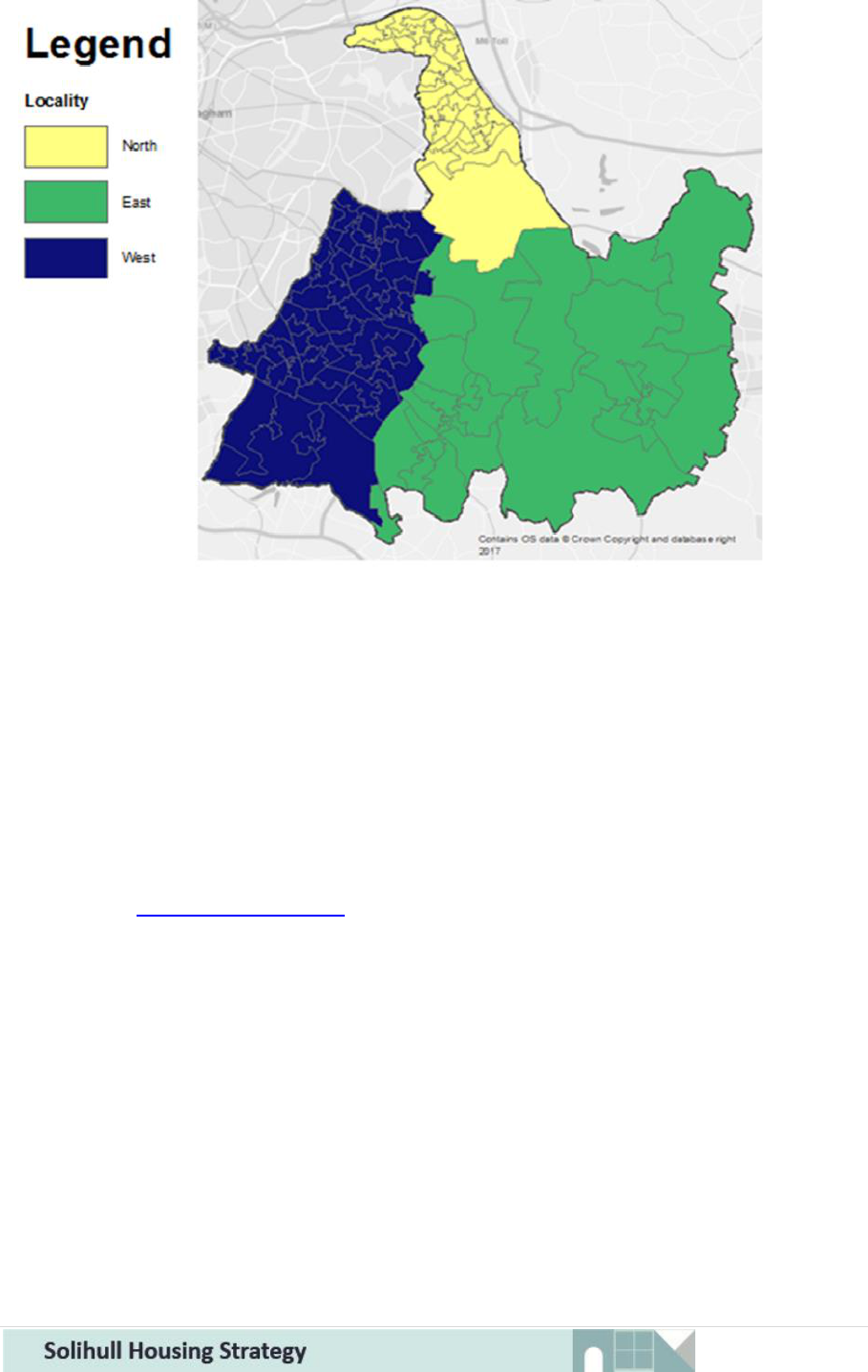
9 | P a g e
3.8 The challenge is to help create a sense of ‘place’, whereby all the Borough’s neighbourhoods
provide attractive, safe, and inclusive places where people choose to create a home. This can create
a beneficial multiplier effect where more housing stability and opportunities within neighbourhoods
creates incentives for people to invest further in their homes and local area. Housing can therefore
both contribute to thriving communities and wellbeing and benefit from a good community context.
3.9 The draft Local Plan will release sites from the Green Belt in accordance with the spatial strategy
of the Plan. There will be significant residential development in the period to 2032 and beyond. This
will mainly be in the East and West Locality areas and will affect existing communities through
population increase and change, increased service demand and the need for new infrastructure.
3.10 Promoting positive health outcomes and tackling inequalities through joint working is vital. The
introduction of Integrated Care Systems is bringing a new focus on ‘Place Based Partnerships’ of
organisations that meet health and care needs to coordinate services and plan to improve
population health and reduce inequalities complements the Council’s localities approach. A key
principle is that decisions are taken as close as possible to the communities that they affect.
3.11 The Solihull place priorities support those in the Health and Wellbeing Strategy. These priorities
including promoting independence in later life, and social connectedness. Housing plays a key role in
helping to deliver these priorities.
3.12 Healthy neighbourhoods are just as important as healthy homes; housing and its environment
impacts health and wellbeing significantly.
3.13 Thriving communities can prevent loneliness and isolation, particularly amongst older people,
younger adults with disabilities and people not in work or training. In these communities every
individual, group or organisation is able to connect to and build their own local network of support.
This helps to create and share community resources, preventing and reducing crises, which might
otherwise need interventions from services.
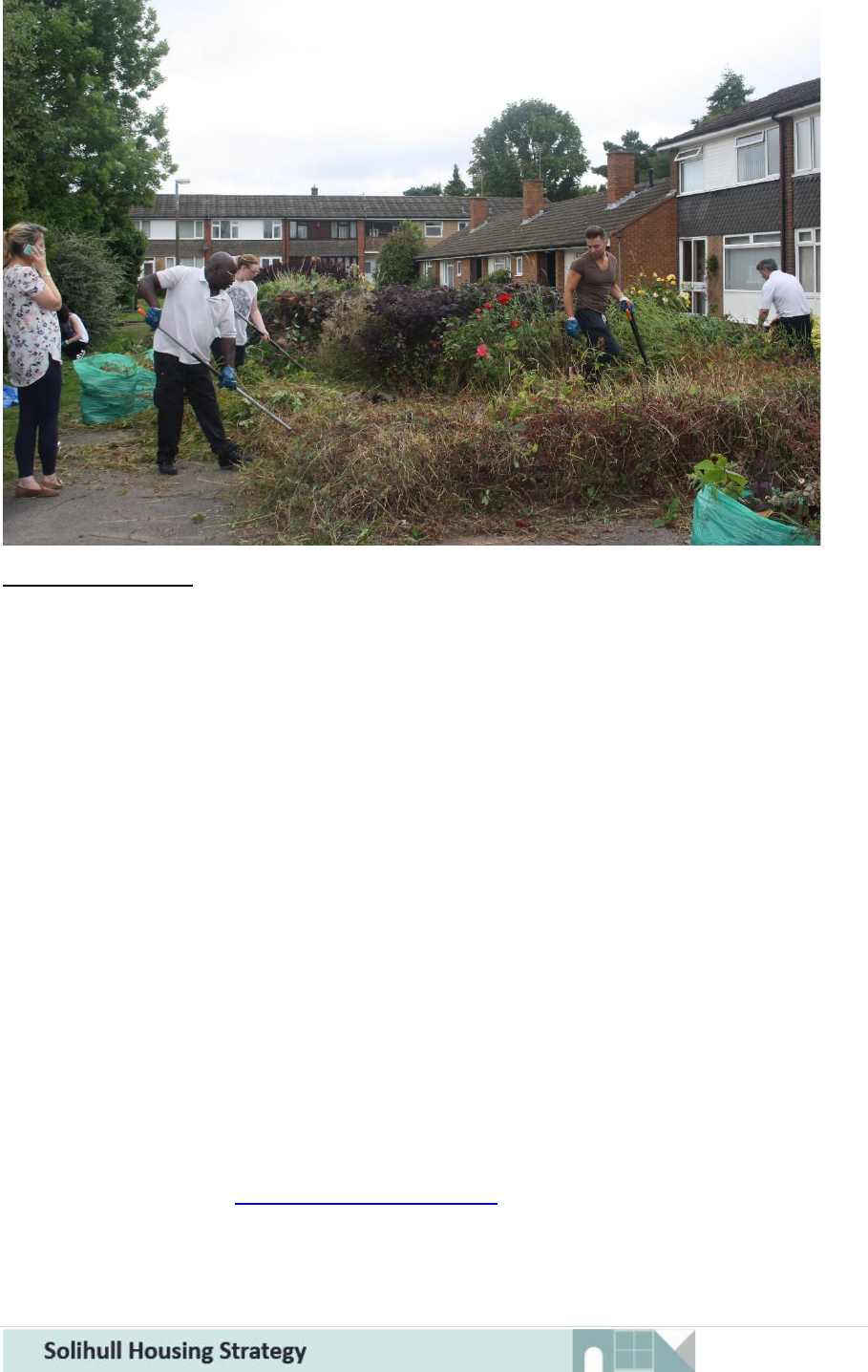
10 | P a g e
Our Housing Ambition
3.14 Recognising the diversity of communities across the Borough, we will work on a multi-agency
basis to create and maintain strong and sustainable communities to ensure that all areas of the
Borough are places where people choose to live and demand for housing is equally distributed.
3.15 Working at a neighbourhood and locality level we will maximise the ways by which the Council
and its partners can promote positive outcomes on a cross-tenure basis through all of our housing
policies, plans and management.
3.16 We will work to ensure communities are,
• Safe - Tenancy and estate management in the social and private rented sectors is a very
important part of tackling anti-social behaviour, harassment, and the fear of crime. We will
work to deliver and promote high standards across both
• Healthy - Our Health Equalities Assessment shows that all parts of the Housing Strategy have
important potential to deliver positive health outcomes. We will establish a Health and
Housing Group which will develop a Workplan ensuring support for those most in need and
improving abilities for people to report health/housing concerns and instigate effective
support
• Connected - Local Plan policies ensure that new housing is supported with the right
infrastructure. Digital connections are increasingly necessary for all; not only in supporting
work and training but also in promoting independence through delivery of health and social
care. The Council’s Digital Strategy 2022 to 2027, is therefore significant supporting the roll
out of superfast and full fibre broadband through the CSW Broadband project, private
providers along with improved 4G / 5G mobile networks with the WMCA’s WM5G team.

11 | P a g e
3.17 The introduction of Integrated Care Systems will complement place-based working. We
recognise the important role of the NHS Birmingham and Solihull Integrated Care System and
support the vision for ‘Birmingham and Solihull to be the healthiest place to live and work, driving
equity in life chances and health outcomes for everyone’. We will work with the NHS Birmingham
and Solihull Integrated Care Board and other health and social care partners to maximise the
contribution that housing can make to meeting people’s health, care and support needs.
3.18 There are significant opportunities to implement place-making principles during the Strategy
period. Two important examples are,
Kingshurst Village Centre. We will deliver this redevelopment scheme to create a high
quality, community focussed centre at the heart of this important neighbourhood. The
Centre will be redeveloped alongside our health partners to offer a range of local services
and play a strong role in building further social capital in the area. Seventy-six new
affordable homes will be provided along with important infrastructure. This will include an
improved road layout linking the village centre to the surrounding area, additional open
green space and high-quality pedestrian links from Kingshurst Park, and a new GP surgery,
pharmacy, dentist and community space alongside retail capacity.
The redeveloped centre will help ensure that Kingshurst becomes a sustainable, well
integrated community with enhanced potential to benefit from its close proximity to the
economic opportunities at the airport, NEC and the rest of the UK Central Hub.
UK Central Hub. We will continue to work with High Speed 2 and the Urban Growth
Company to support Solihull’s growth agenda and create a new, sustainable mixed-use
destination. This will have High Speed 2 at its centre, incorporating additional public
transport connectivity and making better use of land for quality development to support the
delivery of new jobs and homes. We will work with the Council, WMCA and others to
support local people to access training and employment opportunities.
3.19 We will deliver sustainable development and ensure that the right housing is in the right place
to meet local needs for all linking our communities to growth opportunities and access to good
work. Specific policies in the draft Local Plan contribute to supporting communities and promoting
health. These include policies relating to sustainable development, green space, jobs, town centres,
sustainable travel and infrastructure provision. We will implement, monitor and review these to
ensure that they are effectively contributing to inclusive growth and thriving communities.
3.20 We will continue to work with Town and Parish Councils and local communities to ensure that
the Community Infrastructure Levy is apportioned effectively at a neighbourhood level so that local
communities can see the benefit of development and additional demands are addressed.
3.21 Solihull’s voluntary and community sectors, including almshouse charities, play an important
role in connecting with, supporting and developing communities of place and communities of
interest. We will work with these sectors to strengthen housing and care related community
involvement and support.
3.22 We fully support the national Charter for Social Housing Residents and its commitment for
tenants to have a greater voice with their landlords. This is important in obtaining effective customer
insight and responding to needs, both individually and in improving wider areas.

12 | P a g e
3.23 SCH manages over 9,800 Council properties and provides important customer services. SCH’s
work is therefore an important part of building thriving communities. We will continue to agree a
Delivery Plan with SCH which is fully aligned with the Council Plan and this Housing Strategy. We will
monitor the effectiveness of SCH’s delivery and learn from them as we implement and design our
services.
3.24 Private Registered Providers of housing have fewer properties in management than the Council
but have larger numbers in certain neighbourhoods. In addition, affordable housing provided as part
of Local Plan allocated sites will see their number of homes increasing significantly. We will
strengthen our working relationship with them by introducing a senior level Social Housing
Management Forum. We will work with Private Registered Providers to share ideas, good practice
and innovation to ensure high standards across the whole of Solihull’s social housing sector. We
welcome Private Registered Provider involvement in our Localities work and will aim to extend this.
3.25 Social housing providers already invest their own funds into employment support and
community development. We will continue to work with our housing partners to help maximise the
value of this investment.
3.26 We will work with private landlords, lettings agents and tenants to remedy and prevent specific
problems that might occur which affect a local neighbourhood. We will use our legal powers to take
prompt and effective enforcement action where appropriate. This is discussed further in section 4.
3.27 We recognise that problems in small areas can give rise to complaints and detract from a wider
neighbourhood. We will investigate all known and reported ‘problem sites’ to achieve solutions. This
will require identification of legal ownership, agreeing potential legal remedies and contacting
responsible parties.

13 | P a g e
4. Making Best Use of Existing Housing
Challenges and Opportunities
4.1 Solihull’s housing stock is an important and valuable asset requiring ongoing investment and
maintenance. Housing conditions in the private and social housing sectors are comparatively good
and there is strong demand. Significant issues of disrepair and hazardous accommodation do exist,
and it is therefore vital that effective action is taken to tackle these.
Owner occupation
4.2 The condition of properties in the owner-occupied sector is primarily the responsibility of its
owners but the Council recognises limitations on some owners’ ability to maintain and improve their
homes. The Council’s role is limited to providing advice and information with targeted assistance.
The most significant challenge relates to assisting people to repair, maintain and adapt their homes.
This is likely to be most important for older homeowners, particularly those with less financial
means.
Private Rented Sector
4.3 The private rented sector has increased significantly since 2001 increasing from 5.2% (2001) to
9.8% (2011) and 12.8% in 2021. There is strong demand for private rented housing and rents are
relatively high. This reflects the attractiveness of the Borough and the difficulty of accessing home
ownership and social rented housing.
4.4 Solihull’s private rental sector has not only increased, it has also changed. The sector now
accommodates more low income and vulnerable households. There has been a growth in the
amount of ‘Supported Exempt Accommodation’ (SEA) and Houses in Multiple Occupation (HMOs)
which raise important considerations relating to the safety and support for vulnerable people and
value for money in public subsidies.
4.5 The English Private Landlord Survey found that 85% of individual landlords owned between one
and four properties, with 45% owning only one rental property. Solihull’s position is unlikely to be
very different to this. Private landlords have an important role – either positively or negatively – in
the quality of housing, services to tenants and the quality of local neighbourhoods. Landlords may be
‘accidental’ - having come into the role in an unplanned way – or ‘professional’.
4.6 Private landlords have important legal responsibilities, and the Council has powers to ensure
landlords manage their properties well and that private tenants have safe and secure homes and
tenancies.
4.7 Government has set out plans to deliver a better deal for private tenants. This includes plans to
abolish ‘no-fault’ evictions, apply the Decent Homes Standard to the sector, introduce a new
Property Portal to help landlords understand their obligations and a housing ombudsman covering
all private landlords and providing redress for tenants.
4.8 There are a number of challenges,
Developing good knowledge, insight and data about the profile and changing trends and
issues in the private rented sector
The private rented sector accommodates more people in vulnerable circumstances. Poor
conditions can add to and exacerbate those vulnerabilities

14 | P a g e
Landlords maintaining, letting and managing homes according to legal requirements and
standards, with the Council taking effective enforcement action against those that don’t
Council regulatory and enforcement resources are stretched. Increased capacity is needed to
enforce existing and newly emerging standards
Ensuring value for money in housing benefit payments in the SEA sector
Working with landlords and the National Residential Landlords Association (NRLA) to
prepare for legislative change
Encouraging landlords to use their property for full occupancy to meet local needs, rather
than as short-term lets. The growth of the short-term lettings sector reduces the supply for
local permanent residents which in turn inflates the cost of the remaining supply.
Social Housing
4.9 Social housing is provided by the Council (Registered Provider) and housing associations (Private
Registered Provider), and in Solihull is generally in good condition. Thirty housing associations
manage approximately 3,500 homes and SCH, on behalf of the Council, 9,800.
4.10 Government is moving to strengthen the regulation of social housing through the Regulator of
Social Housing and introduce a new Charter for Social Housing Residents.
4.11 The acute shortage of social housing means we need to make best use of existing stock. The
identified challenges are,
Delivering high quality housing services and helping to build thriving communities
Maintaining, letting and managing homes to a high standard
Tackling underoccupation effectively through attractive housing options, practical assistance
and incentive payments
Taking effective action against tenancy fraud.
4.12 The Council and Private Registered Providers have important challenges with their existing
stock to ensure compliance with new building safety legislation and have effective asset
management strategies.
4.13 This is a significant challenge for the Council and SCH. 65% of the Council’s HRA stock is
between 50 and 60 years old. There are 37 high rise blocks which require significant investment to
meet new safety standards. Maintenance accounts for a large proportion of HRA expenditure and it
is the biggest single driver of customer satisfaction.
4.14 There is therefore a need for active asset management which may result in a mix of acquisition,
disposal, development and redevelopment to ensure value for money and that the HRA stock is fit
for the future. The joint Council/ SCH 10-year Asset Management Strategy will help achieve these
goals.
4.15 Housing association stock is younger, and each association makes its own maintenance and
management decisions and is responsible to their Boards of Management and ultimately the
Regulator of Social Housing which collects data and monitors the landlord performance. The Housing
Ombudsman Service investigates complaints about Registered Providers in a free, independent and
impartial manner.

15 | P a g e
Our Housing Ambition
4.16 We will work across all housing tenures so that Solihull has a good and well-maintained housing
stock that is suitable for its occupiers, well managed and effectively utilised.
4.17 We recognise that owner occupied housing that is in need of repair, and which is dangerous
may be occupied by an older person. Our work to help older people at home is therefore important
in identifying risk, improving homes, promoting independence and better health outcomes.
4.18 We will enable people to maintain and improve their homes and signpost to reputable traders.
We have partnered with No Rogue Traders and TrustMark which helps people to find approved
tradespeople.
4.19 We will assist older, vulnerable and poorer homeowners with repairs and improvements
through Disabled Facilities and Minor Works grants. This will help owner-occupiers of dwellings that
are in poor repair or pose a serious health and safety risk to improve them. Repair assistance will
cover works where the property poses a serious risk to health and safety and minor repair assistance
will be available to people over 60 years of age and vulnerable/disadvantaged households in receipt
of a means tested benefit.
4.20 Where the condition of a property is so poor that it is presenting a nuisance, we will use our
statutory powers to provide and enforce remedial action.
4.21 An empty home is a wasted asset and can also be detrimental to local neighbourhoods. We are
committed to tackling empty homes and returning them to use and have approved application of
the full Council Tax premium in such cases. A separate Strategy sets out how the Council will seek to
minimise the number of long-term empty homes in the Borough.
4.22 We will,
Identify – Where the property has been empty for 6 months or more and is unfurnished,
where possible the owner will be provided with advice and information. A direct approach
will be attempted where the property has been vacant for 12 months or more depending on
the circumstances of each individual case
Charge – The maximum Council Tax premium that is allowed by legislation will be charged to
incentivise owners to bring empty properties back into use and improve the overall supply of
housing in the Borough
Enforce - Where the property condition is so poor that it is presenting a nuisance, the owner
may be subject to enforcement action. Advice and encouragement will be given to the
owner to take the necessary steps to remedy disrepair in accordance with the Council’s
Enforcement Policy
Enforced Disposal – An owner may pay the empty property premium but refuse all offers of
advice and assistance. In these cases, we will consider legal and regulatory options which
may result in an enforced sale or compulsory purchase.
4.23 We will work to promote a well-managed private rental sector in Solihull as an essential
element of a well-functioning local housing market. We support the Government’s objectives for a
fairer, more secure, and higher quality private rented sector.
4.24 Most private landlords and lettings agents provide a good service, but the Council and other
organisations receive complaints about both property condition and landlord services.

16 | P a g e
4.25 Our strategic approach will be based on the following steps,
Intelligence - Bringing together data and intelligence from, for example, tenancy deposit and
redress schemes, Energy Performance Certificates, landlords, properties and
neighbourhoods, and making best use of it
Prevention – Using an intelligence led approach to proactively identify and prevent problems
from escalating to crisis
Engagement – With the NRLA, landlords and letting agents, and encouraging self-policing
amongst landlords and agents
Development – Ensuring that all private landlords understand their legal obligations, the
Council’s policies and schemes that they can use to improve their properties
Enforcement – We will use our legislative powers to safeguard and protect tenants and
improve housing conditions and energy efficiency.
4.26 The intelligence led approach will help us to identify landlords and lettings agents that
represent a high proportion of complaints and take a more targeted approach to enforcement
accordingly. We will actively deal with rogue landlords and agents who are seriously or persistently
failing in their responsibilities to tenants. We will welcome information from landlords and others
about poorly performing and ‘rogue’ landlords and will treat this confidentially in following it up. We
will work to help tenants have the confidence and knowledge to complain and make their individual
and collective voices heard.
4.27 We will work in partnership to promote good standards and help ensure landlord services are
efficient, effective and provide the customer with value for money. Solihull Council is a member of
the Midland Landlord Accreditation Scheme which works to provide information and training for
landlords and encourage joint working. We support their work which helps to develop landlords and
maintains a list of accredited landlords and agents. We will continue to convene forum meetings
with the NRLA to help improve the sector.
4.28 An important addition to this work will be the Government sponsored West Midlands Private
Rented Sector Pathfinder Programme. We will work in partnership with other West Midlands local
authorities to help deliver efficient, effective, and robust regulation.
4.29 It is important that there is effective regulation. We will work with national and regional
professional landlord bodies to help them deliver high quality services.
4.30 We will use our enforcement powers under the Housing and Planning Act 2016, and other
legislation, to tackle poor conditions and management such as illegal eviction, breach of a banning
order, failure to comply with improvement and overcrowding notices and management regulations
in respect of HMOs.
4.31 The growth and changing nature of the private rented sector means that this is an important
area for strategic and policy development in the first delivery period of the Strategy. We will focus
this work on,
Supported Exempt Accommodation – Where a landlord provides accommodation and the
care, support or supervision to the tenant, national housing benefit regulations allow much
higher rents to be charged. Other areas of the West Midlands region have seen large
increases in the incidence of exempt status accommodation which has not been
commissioned by a local authority and where unscrupulous agencies have claimed higher
housing benefit levels while providing minimal or no levels of support. We will work with

17 | P a g e
other local authorities in the region, and through the WMCA, present evidence to
Government on the need for national changes to regulations so that this can be effectively
managed. Alongside this, we will carefully examine the need for local policy to ensure that
good level of care is provided, and public money protected
Selective Licensing policy – Local councils can introduce selective licensing schemes where
this is supported by evidence and consultation occurs. A policy would mean that all landlords
in a designated area would require a licence. This would ensure that all privately rented
properties within the designated area are managed to a satisfactory standard with landlords
made aware of their responsibilities, and tenants of their rights. Licensing schemes can
contribute to reducing crime and raising housing conditions
Houses in Multiple Occupation – HMOs can play a beneficial role, providing accommodation
for single person households who are unable to afford self-contained housing and for those
whose need is for a shorter-term tenancy than those provided by the self-contained private
rented market. HMOs can, therefore, assist in making best use of existing stock from a
housing needs perspective. However, high concentrations of HMOs can present challenges
to the longer-term sustainability of neighbourhoods and impact on their character. We will
identify and map the existing distribution of HMOs across the Borough and review the need
for a Borough-wide or area based ‘Article 4 Direction’ policy to give the Council greater
oversight and control of this part of the private rented sector. We will also review the need
to introduce an additional HMO Licensing scheme for smaller HMOs (with three or four
unrelated tenants sharing one or more amenities) in addition to the current statutory
scheme for properties with 5 or more bedspaces.
4.32 The Council and SCH will work to make best use of the Council housing stock through asset
management and effective letting of housing.
4.33 We will implement the approved 10 year joint Council-SCH Asset Management Strategy. This
will ensure the Council takes a corporate approach to decision making for land and property assets
and their repair and maintenance. We will continue to model asset performance alongside the
outcomes of resident consultation to help determine the steps we need to take to respond to local
priorities and improve performance and satisfaction with our homes and neighbourhoods.
4.34 A building safety delivery group oversees and informs the approach to building safety
requirements in response to safety reforms, in particular the Building Safety Act.
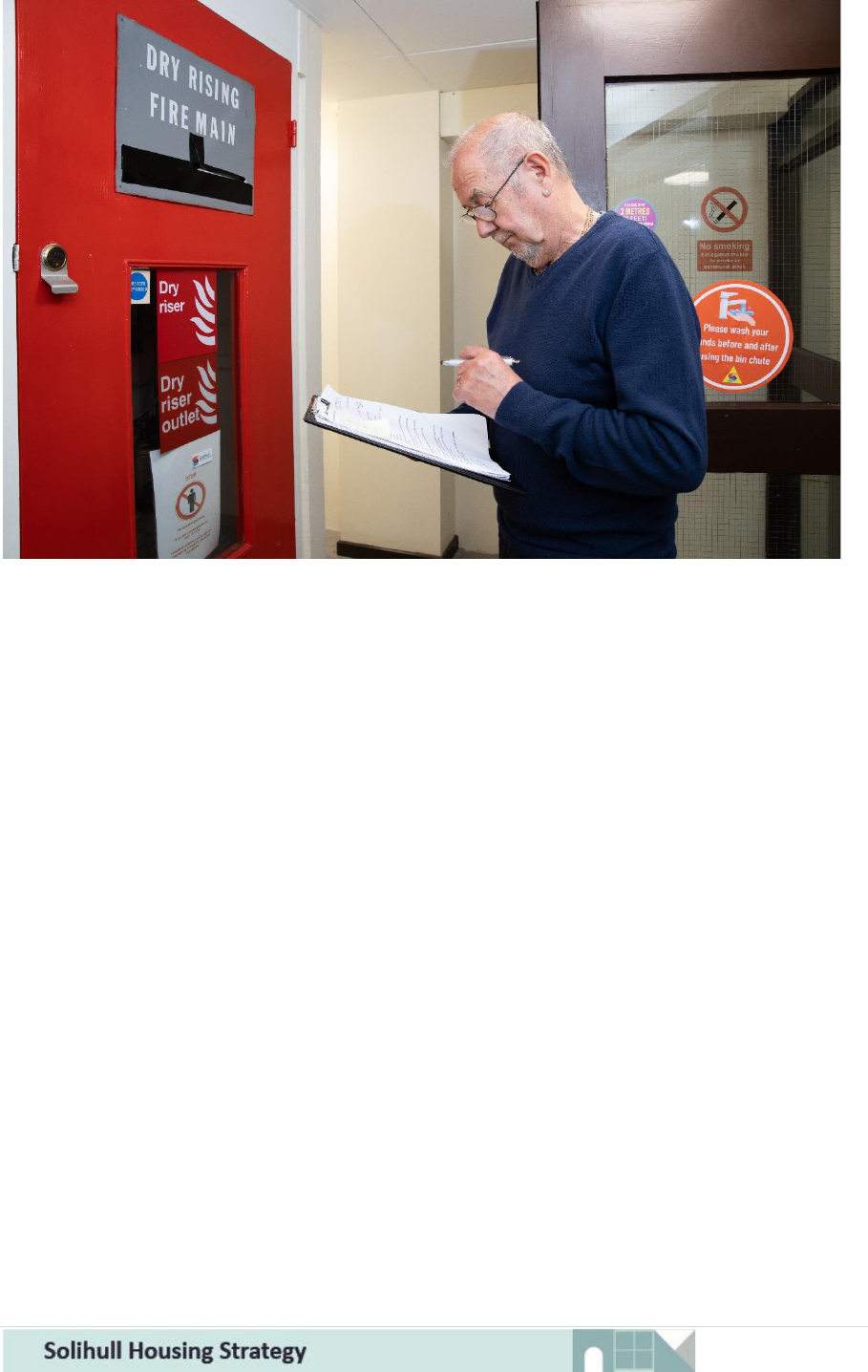
18 | P a g e
4.35 We will continue to review our housing, garages and other assets to identify those that are
class ‘A’ (perform well and are likely to be sustainable), ‘B’ and ‘C’ (relatively poor overall quality and
financial performance). Where an asset is identified as not sustainable or no longer fit-for-purpose,
we will identify an alternative use which may include remodelling, redevelopment or disposal.
4.36 Social housing is a scarce resource and policies for housing allocation and tenancy management
are therefore very important to ensure a fair and effective approach and help contribute to strong
communities. High tenancy turnover and/or high void times for empty property are a wasted
housing resource and a loss of important revenue. Management performance is important in helping
to tackle this and the SCH Delivery Plan sets relevant key performance indicators.
4.37 The Council’s Housing Allocation Scheme is a statutory function which establishes and manages
priorities between applicants with varying types of housing need for accommodation. We will
ensure that the qualification and prioritisation criteria meet need in the most effective way and
make best use of the available housing, including tackling overcrowding, achieving efficient letting
and in helping to create successful tenancies. A new annual plan will provide for greater flexibility
and responsiveness. We recognise that the quality of our housing management and how complaints
and anti-social behaviour is dealt with are important in reducing property ‘churn’.
4.38 The Housing Allocation Scheme can promote wider objectives relating to Safeguarding,
employment, support for Veterans and community cohesion. We will work to ensure the Scheme is
effective in supporting these objectives.
4.39 Larger family homes can become under occupied once children have grown up and left home.
Freeing up larger under occupied properties is important in making best use of housing and can also
help to provide a person with a more suitable home. We will work sensitively to reduce under
occupation and will consider options to help facilitate this through,
Giving under occupation a high priority in our Housing Allocation Scheme

19 | P a g e
Relocation assistance
Financial incentives
Prioritising downsizing households for new build, particularly those suitable for older people
such as bungalows and ‘extra care’.
4.40 We will review the Council/SCH Tenancy Policy to set our approach on secure and fixed term
tenancies. This will balance support for tenants and supporting stable communities with making the
best use of the housing stock. A revised approach could be based on secure (‘lifetime’) tenancies for
most general needs housing with fixed-term tenancies reserved for properties having received
disabled adaptation works, large properties (4 or more bedrooms), supported housing schemes and
those set aside for specific purposes (for example the ‘Rough Sleeper Accommodation Programme’).
4.41 Tenancy fraud is also a challenge to making best use of our housing assets. Although this is not
considered a current problem, we will keep under regular review and robustly audit our housing
management systems to prevent fraud and make best use of social housing.
4.42 Housing allocation and tenancy management is also very important in the housing association
sector. Each housing association landlord is responsible for managing their own properties and
tenancies and developing their own asset management strategies. They have their own executive
Boards and are responsible to Government regulators. Through our Social Housing Management
Forum, and sub-groups that may be formed from this, we will engage with Private Registered
providers and use our influence to help ensure that they are making best use of their housing stock
and partnering with us in meeting housing need through lettings. Private Registered Providers may
also introduce innovative approaches that we can learn from.
4.43 We will also expect that all providers give proper attention to the management of their
tenancies and property maintenance. This particularly includes responding well to complaints of
disrepair and adopting a proactive and zero-tolerance approach to incidences such as damp and
mould which can be seriously debilitating for residents.

20 | P a g e
5. Tackling Climate Change
Challenges and Opportunities
5.1 Decarbonising the Borough’s housing stock is a significant challenge. Domestic buildings account
for 27% of the Borough’s CO2 emissions, the second biggest subcategory of emissions.
5.2 The Net Zero Action Plan (NZAP) aims to make Solihull a net zero carbon Borough by 2041.
Achieving this ambition will require significant shifts across all sectors, and quickly.
5.3 A 2021 ONS survey found that only 19% of people had considered making changes to improve
their home’s efficiency. Insulation was the most common improvement being considered (39%). The
most common reasons for not making changes were because people felt their home was already
efficient enough (35%), because they did not own their home (29%), and because making
improvements would cost too much (28%). This indicates an important challenge in promoting
better awareness and behaviour change amongst landlords and residents.
5.4 ‘Your Future Solihull’ (YFS) creates a vision for a prosperous low carbon future for the Borough.
Collective action is needed to make our low carbon vision a reality. Our YFS programme has a strong
behavioural change focus to help residents and businesses make sustainable choices and better
understand the environmental and financial benefits of a low carbon society.
5.5 Responding effectively to the Climate Change emergency will require action from everyone
across the Borough, but there are also huge opportunities during this transition. Work to retrofit
properties and the creation of new low carbon jobs provides an opportunity to encourage inclusive
growth. Energy efficiency delivers energy cost savings and is a key driver in reducing fuel poverty.
Warmer homes help to tackle the effect of cold homes on poor respiratory, cardiovascular, mental
health and child health.
5.6 To meet its Climate Change Declaration and tackle fuel poverty, improving energy efficiency of
homes through ‘retrofit’ and building new homes to higher environmental standards is vital. Energy
efficiency improvements to building fabric make possible the shift from high-carbon gas heating to
other systems such as heat pumps and district heating.
5.7 56% of Solihull’s residential properties have an Energy Performance Certificate (EPC). 68% of
these have an EPC rating of between D to G. The Government’s ambition set out in the Clean
Growth Strategy is for all homes in the UK to have an EPC rating of C by 2035. A large proportion of
Solihull’s housing will need to undergo some degree of ‘retrofit’ to bring it up to this standard and
reduce the domestic contribution to the Solihull’s carbon footprint.
5.8 This means that there is an important ‘retrofitting’ challenge to provide ‘fabric first’ energy
performance improvements – such as external wall and cavity wall insulation, loft insulation and
window improvements - to as many homes as possible. Effective community engagement and
working with property owners is necessary to secure engagement and support. There are also the
challenges of a limited number of trusted and accredited professionals and suppliers and retrofit
affordability.
5.9 The challenge is primarily one of the private housing sector, which accounts for approximately
85% of housing in the Borough. Homeowners, private landlords and tenants need to have awareness
and understanding of available schemes, be able to access trusted suppliers and take-up available
schemes. In the private rented sector, there is a need to work with landlords and lettings agents to
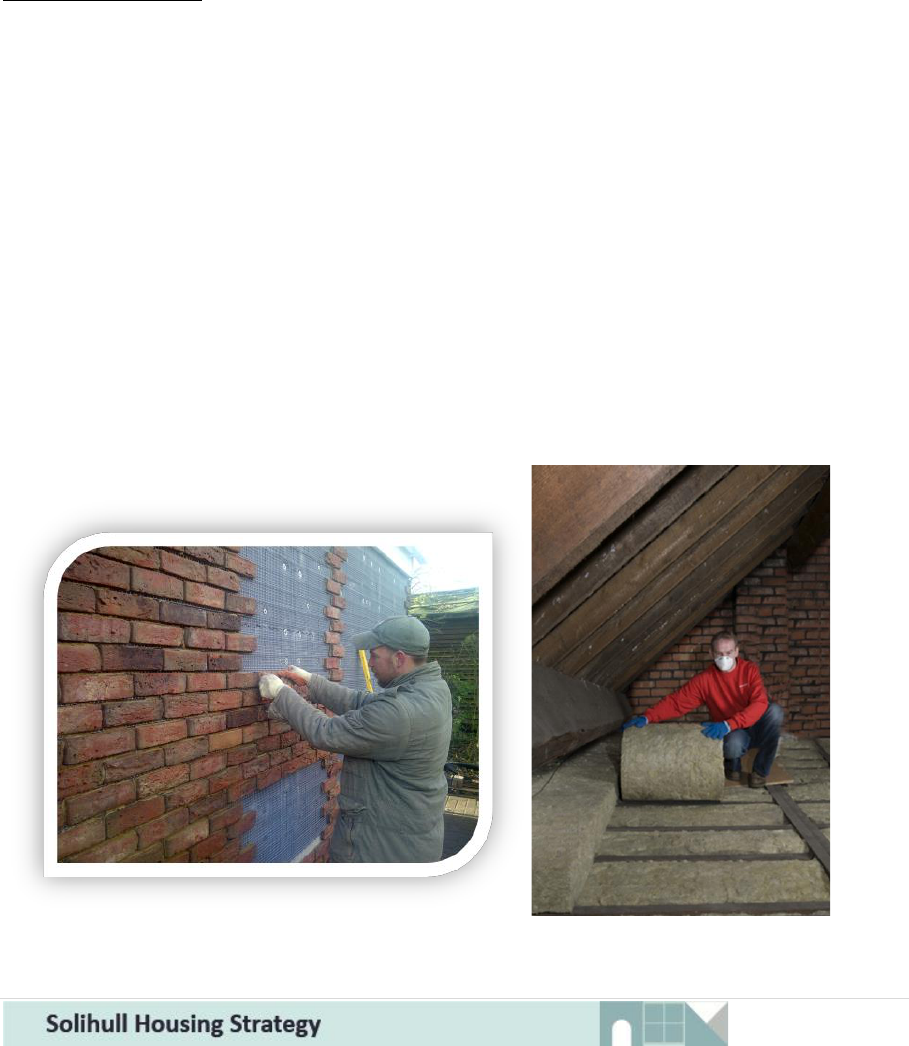
21 | P a g e
promote delivery and use enforcement powers where available. Unless exempt, all new privately
and socially rented tenancies from December 2025 must be at least EPC C. All existing tenancies
must be at least EPC C from 31 December 2028 ‘where practical, cost-effective and affordable’.
5.10 72.5% of homes in the Council’s ownership are already at EPC band C or above. Of the homes
that are currently below this, over 2,700 homes are in Band D with a small number in bands E, F or
G. The extent of works and costs for the Council stock reaching zero carbon by 2041 however are
considerable.
5.11 Private Registered Providers have their own capital programmes of work to deliver stock
improvement and are responsible to the Regulator of Social Housing. The Government’s Decent
Homes Standard review will consider how the standard can work to better support energy efficiency
and the decarbonisation of social homes.
Our Housing Ambition
5.12 We will,
Implement the Council’s Climate Change Declaration and NZAP through our housing policies,
investment decisions and partnerships
Commence a broad programme to retrofit assess every property in the Borough to advise
households what actions they can take
Work to help deliver place-based high quality, cost- effective domestic retrofit to low-
income households, which results in a housing stock that is more energy efficient and
capable of using low carbon heat. This will result in lower carbon emissions and domestic
energy bills, increased comfort and improved health and wellbeing
Support the ‘able to pay’ market by working with Trustmark and other services so that
people can access good information about retrofit. This will help people to assess their
home, find contractors and ask relevant questions during the process
Explore options and maximise the use of available funding to support residents of the
Borough to achieve an overall reduction of emissions from their home.
5.13 The Energy Company Obligation (ECO) requires larger energy suppliers to provide energy
efficiency and heating measures for fuel poor households. ‘ECO4’ is running to 2026, supported by

22 | P a g e
significant national investment each year. Our Statement of Intent determines who is eligible and
has a focus on helping the most vulnerable in the worst-quality homes. We will work with utility
providers to maximise help for vulnerable people and overall retrofit investment in the Borough
under ECO4 and ECO Flex.
5.14 We will work to improve our evidence base and understanding to identify targeted area
interventions and initiatives. Different approaches are likely to be required. For example, the
approach for low income and vulnerable households who are likely to be eligible for grant funding
may differ from households with higher income or where the owner is a private landlord.
5.15 Through marketing, communication, information and advice we will engage with homeowners,
private landlords and tenants to stimulate more consistent, long-term and stable demand for retrofit
investment. Our engagement with private landlords will be particularly important to ensure their
tenants are not living in fuel poverty.
5.16 We will develop our in-house technical expertise on retrofit assessment delivery and work with
our partners to ensure grant programmes are well delivered and effective works are completed. We
will develop capacity and capability to support delivery of retrofit programmes and standards and
will work with business networks and the Chamber of Commerce to do this.
5.17 National strategies set out a vision for a ‘greener future’ involving the creation of 240,000 green
jobs by 2035. We will work to help develop the green economy and associated jobs and support
local retrofit supply chain capability and capacity. We will align our work with the Solihull Economic
Strategy to influence and stimulate local supply,
Providing assistance and encouragement to regionally based businesses to accelerate their
capacity, skills and expertise to deliver retrofit programmes
Workforce development to provide pathways into apprenticeships and jobs, through
training, accreditation and qualifications
We will keep under review the benefit of additional measures, including the Council taking a
more direct role to help ensure successful roll out of approved schemes.
5.18 Retrofit investment provides good opportunities for the growth of small and medium enterprise
companies, employment of local labour and pathways into apprenticeships. This can make an
important contribution to our work to promote inclusive growth.
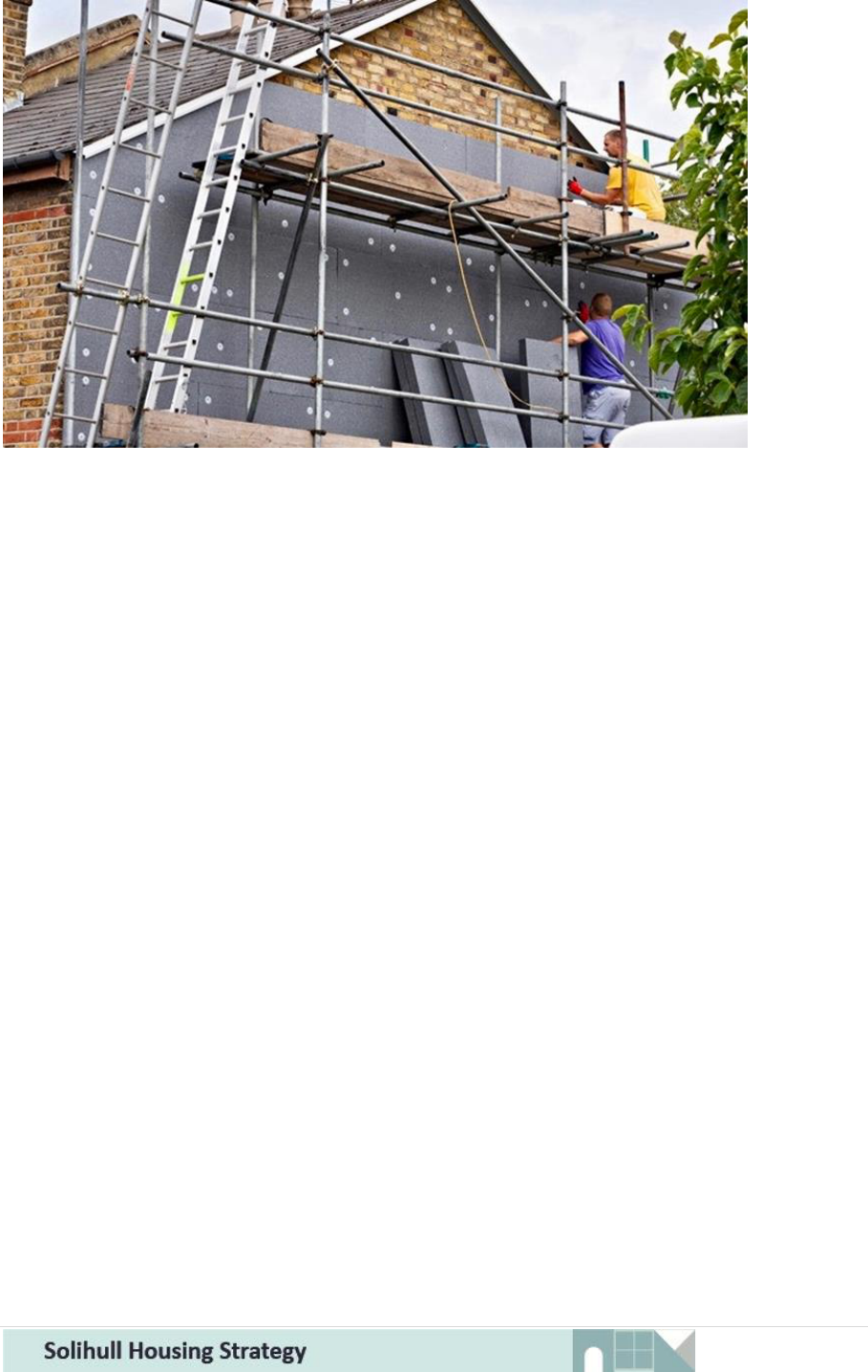
23 | P a g e
5.19 We will invest our own resources to help deliver domestic retrofit programmes by,
Helping to fund retrofit assessments in the private housing sector to help kick-start demand
and programmes of work
Delivering a Retrofit Enabling fund to help properties be ready for retrofit by financing
decluttering, cleaning and other work.
5.20 Through our housing services and relationships with the local voluntary and community sector
we will help to enhance the Council’s approach to climate change engagement and communications.
Developing an effective retrofit communications approach will be an important part of this and will
help to better understand social attitudes and identify effective approaches to achieve the scale of
the transformation required. We will do this in liaison with the WMCA behaviour change work and
actively learn from what is working in other areas.
5.21 The WMCA ‘Sustainable Warmth Programme’ aims to demonstrate place-based street-by-
street retrofit and neighbourhood regeneration across a mixture of housing tenures. We welcome
the WMCAs initiative and will work with them to maximise the benefit and share learning to achieve
effective approaches to community engagement, technical delivery and finance models.
5.22 There are currently important limitations in the extent and nature of Government funding for
retrofit. We will use our voice with regional partners and directly with Government to help improve
this as retrofit programmes become established investment programmes.
5.23 Through our asset management work, we will establish the current carbon emission levels for
the Council housing stock and providing a trajectory for achieving net zero emissions by 2041,
including interim targets.
5.24 We will deliver an £11 million energy efficiency programme so that all properties are Band C by
2030. Beyond this, we will invest to meet stretch targets for Council homes to be net zero carbon by
2041 This will see investment in loft insulation top-up, pre-2002 window replacement, external wall
insulation, boiler upgrades and air source heat pumps (or other heating upgrades).

24 | P a g e
5.25. We will engage with and support all Private Registered Providers to deliver improvements to
their stock and will monitor progress and share good practice and learning. Where possible we will
include their stock in Government programmes, which can benefit low-income households.
5.26 Where appropriate we will use our regulation and enforcement powers to raise the energy
performance of properties. The Minimum Energy Efficiency Standards (MEES) in the private rented
sector prevents landlords from letting properties rated below EPC Band E with this due to be
extended to EPC Band C. At a national level, the proportion of households in fuel poverty is highest
for private renters. It is not acceptable for landlords to let sub-standard properties that may have a
negative impact on their tenants’ health and wellbeing, as well as contributing to fuel poverty.
Where landlords are letting properties without EPCs, or with an EPC below the minimum standard
we will use our legal powers to enforce against this and raise standards.
5.27 This is a comparatively new, challenging and ambitious agenda of work. We will work with a
wide range of partners who can contribute to it. In particular we will work in close collaboration with
the WMCA, the Greater Birmingham and Solihull Local Enterprise Partnership, the Midlands Net Zero
Hub, Act On Energy and the NRLA.
5.28 By far the majority of the housing that will exist at the end of the Strategy period is already
built. It is important however that new homes are built to higher standards. We will work to ensure
that more environmentally sustainable housing is built.
5.29 Where the Council builds or commissions new homes for social rent, these will be to a net zero
standard. We will work with Private Registered Providers to help enable any direct development that
they do is also built to a net zero standard.
5.30 With regard to new private housing, from 2025, the Future Homes Standard will ensure that
new homes produce at least 75% lower CO2 emissions compared to those built to current standards.
This represents a considerable improvement in the energy efficiency standards for new homes.
Homes built under the Future Homes Standard will be ‘zero carbon ready’, which means that in the
longer term, no further retrofit work for energy efficiency will be necessary to enable them to
become zero-carbon homes as the electricity grid continues to decarbonise.
5.31 Our work to tackle Climate Change will also reduce fuel poverty. The Government’s 2019 Fuel
Poverty Strategy introduced the ‘Low Income Low Energy Efficiency’ (LILEE) fuel poverty metric.
Under LILEE, a household that achieves an energy efficiency rating of band C or above would not be
measured as fuel poor. We will work to improve as many fuel poor homes as is reasonably
practicable to a minimum EPC band C by 2030. We recognise that even in these circumstances many
people will have very real difficulties in heating their homes.
5.32 Working with health, care and other partners, we will take proactive steps to maximise the
delivery of retrofit works in the homes of vulnerable people. Through Act On Energy’s outreach
worker we will ensure that a range of professionals can make referrals on a household’s behalf or
promote self-referrals.
5.33 Tackling fuel poverty and reducing excess winter deaths is vital. We will work with the WMCA’s
fuel poverty task force to identify funding opportunities to help tackle fuel poverty as effectively as
possible.
5.34 We will work in partnership with Act on Energy and Age UK Solihull and continue to make
advice and support available to households, as well as operate an annual Winter Warmth Campaign

25 | P a g e
to ensure that vulnerable households receive information about how to access energy efficiency
measures and keep warm in winter.
5.35 An important part of the Winter Warmth Campaign is the network of energy efficiency
volunteers that has been created. Trained volunteers will continue to provide personal support to
vulnerable residents in relation to energy efficiency advice, utility bills and income maximisation. It is
very important that residents can receive good energy advice and support to help take them through
retrofit. We will continue to contract a specialist partner to help us provide this.

26 | P a g e
6. Meeting the Housing Needs of Older People
Challenges and Opportunities
6.1 Older people are a core part of our local community. There are many who are active in
volunteering, providing care for family members and friends and in bringing spending power to local
centres.
6.2 The number and proportion of older people in the Solihull population is increasing. This is mainly
because the local population is ageing rather than more older people are moving into the Borough.
6.3 The number of people aged 75 and over is projected to increase by 31.8% (7,147 people)
between 2020 and 2036 to comprise 12% of the population. Within this, the rise in the number of
people aged 85 and over is the greatest, projected to rise by 3,648 – a 53% increase.
6.4 It is projected that there will be a 35% increase in the number of people aged 65 and over with
dementia and a 31% increase in those aged 65 and above with mobility problems.
6.5 The rising numbers of older people with dementia or limited mobility and increasing care needs
living in unsuitable family homes or residential care is a significant and growing challenge to social
care, health, and housing services. More people will have other health conditions and will require
very complex care. There are factors towards a growing dependency at the same time as a national
shortage of social care staff and other workforce pressures.
6.6 Every decision about care is a decision about housing and it is therefore essential that housing
and care policies are effective at the local level. A lack of suitable housing options results in too
many people staying in hospital unnecessarily or moving to residential care prematurely.
6.7 It is important that older people are encouraged to plan ahead so that they can make positive
housing choices and decisions while they are well and independent. This may involve remaining in
the current home, adapting homes to support longer independence and safe living, ‘downsizing’ to
more suitable general needs housing, or moving to some form of specialist accommodation.
6.8 Specialist accommodation takes a number of forms, ranging from age-restricted general market
housing, retirement living or sheltered housing, extra care housing and residential care and nursing
homes. People will have different needs and preferences and it is important that they are helped to
understand their choices and receive support to access their preferences at the right time.
6.9 The Council’s Market Position Statement recognises that prevention and early intervention is an
effective approach to supporting communities and enabling older people to live independently in
their own homes for longer without the need for formal care services. This avoids premature
intervention which removes natural support structures and creates dependency and over provision
of care services.
6.10 The majority of older people in Solihull are homeowners. There will be older people in owner
occupied housing with limited finances whose homes are in disrepair and may be hazardous to
health and safety. The condition of homes may be satisfactory but falls and trip risks may exist which
can often disproportionately affect negative outcomes to this demographic.
6.11 There is a national trend towards more households aged 65 and above living in the private
rented sector, with this forecast to increase. This raises some important considerations for older

27 | P a g e
persons wellbeing including affordability, limited security of tenure, affordable warmth, and
accessibility to an independent living-supportive environment.
6.12 The significant cross-tenure housing challenge is to promote more good quality, accessible
homes. This will be delivered through,
Effective adaptations and minor works to existing homes
Developing and maintaining a Disabled Facilities Housing Register within the Council’s
housing stock as adaptation works are undertaken
Building of new homes to higher accessible and adaptable standards
Providing more specialist housing for older people
Ensuring older people have a broader range of housing options.
6.13 National and local data suggests that many older people wish to stay in their existing home, or
at least remain in their neighbourhood. It is important to provide the options for older households
thinking about ‘rightsizing’ as a means to live independently for longer. This is a fundamental pre-
requisite for promoting independence and enabling older people to live well in the community.
6.14 Reflecting the socio-economic diversity of the Borough, older people in Solihull have a very
wide range of income and capital. In broad terms the older population will have ‘high’, ‘medium’ or
‘low’ levels of income and wealth and their housing options will vary accordingly. Much of the
market-led specialist development is aimed at those older people with high levels of income and
capital. Conversely, Council commissioned schemes will generally focus on those with low income
and capital. This can leave a gap in the medium income and capital part of the market.
Developments that provide for this part of the market are important to ensure improved housing
choices for all older people. Private developers have begun to offer shared equity and rental
opportunities on extra care development, and this is welcomed.
6.15 A positive consequence of older households engaging more with ‘rightsizing’ is the potential to
release more family sized accommodation into the market for ownership or private rental. This can
contribute to the wider aims of the housing strategy, diversifying and increasing the supply of
housing in the local market.
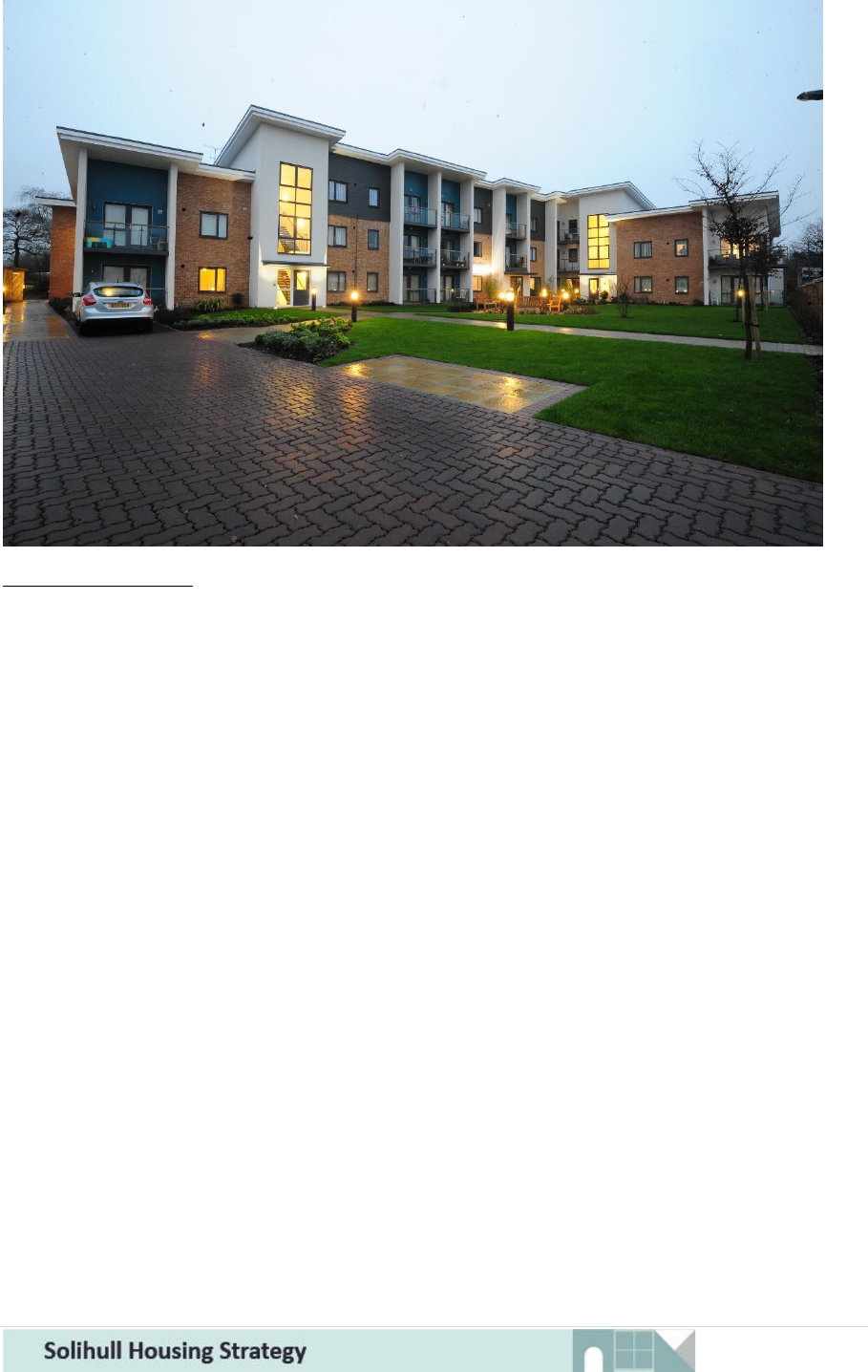
28 | P a g e
Our Housing Ambition
6.16 This Housing Strategy supports the Council’s Adult Social Care Plan. We will work to ensure that
older people have good housing and support options and are able to make informed decisions about
them, plan ahead and take-up options in a timely fashion.
6.17 We will work to promote good housing options for older people in the following ways,
Engage with local people to better understand their needs and preferences for support at
home, the housing options available, and their aspirations to achieve or maintain
independence and wellbeing
Support people choosing to remain in their own homes. We will ensure people can adapt
their homes through Disabled Facilities Grant and Minor Adaptations and access practical
tools and technology, to live independently and live well in their own home. Community
support through Occupational Therapy and Reablement services will also make provision for
residents to identify and support eligible independence needs
Review the availability of a range of housing options with care in the Borough,
understanding demand and needs, current capacity and opportunities to provide more
specialist accommodation for older people
Draw on multi agency expertise to promote effective intelligence gathering, planning and
interdisciplinary liaison to deliver integrated health, care and support in different housing
options.
6.18 Advice on housing options, preventative assistance and how to get a repair carried out are all
important. Technology Enabled Care, Disabled Facilities Grants (where applicable) and Minor
Works, ‘handyperson’ and the ‘Safe and Sound’ service provided by SCH are therefore significant
services that promote this. We will keep these services under regular review and aim to extend their
reach across the Borough.

29 | P a g e
6.19 More older people with complex needs are living at home. The roll out of digital services will
provide further opportunities to enhance independence further. We will ensure that older people
have access to practical tools and technology enabling them to maintain or gain independence,
allowing them control over their lives. We will work with Private Registered Providers and others to
promote the use of digital solutions.
6.20 Through our Strategic Housing Options with Care Board, we will work to ensure that health,
care, housing, community support services work effectively together. We will integrate housing
effectively into local health and care strategies. Working in this way will also deliver effective
hospital discharge to enable prompt return home and help avoid unnecessary hospital admissions.
6.21 Our wider work such as promoting affordable warmth, access to GP and other health services,
social opportunities and improved public transport provide the important enabling background to
help make this work effective.
6.22 Through our role in providing housing services and our work with Private Registered Providers
and private landlords, we will aim to increase the reach and effectiveness of ‘Community Advice
Hubs’ and the community resources that can identify and support people who are isolated or at risk
of harm.
6.23 We will work to identify older people in owner occupied housing with limited finances and who
are at risk. We will provide advice and assistance to them including discretionary assistance through
the Council Housing Assistance policy and SCH Adaptations Policy for Council tenants. Through a
register of adapted Council properties, we will provide improved housing choices for people with
disabilities and reduce costs in adapting properties.
6.24 Some older people may want to move to specialist accommodation or alternative general
needs housing but feel unable to deal with a move, particularly where they do not have family
nearby. We will work to introduce help to move packages to support people to move where they do
not have family to help.
6.25 A person may want to move, and an important part of meeting need will be through general
purpose new homes built to ‘accessible’ and ‘adaptable’ standards and which are suitable and
attractive for ‘downsizing’. We will encourage this through our draft Local Plan policies.
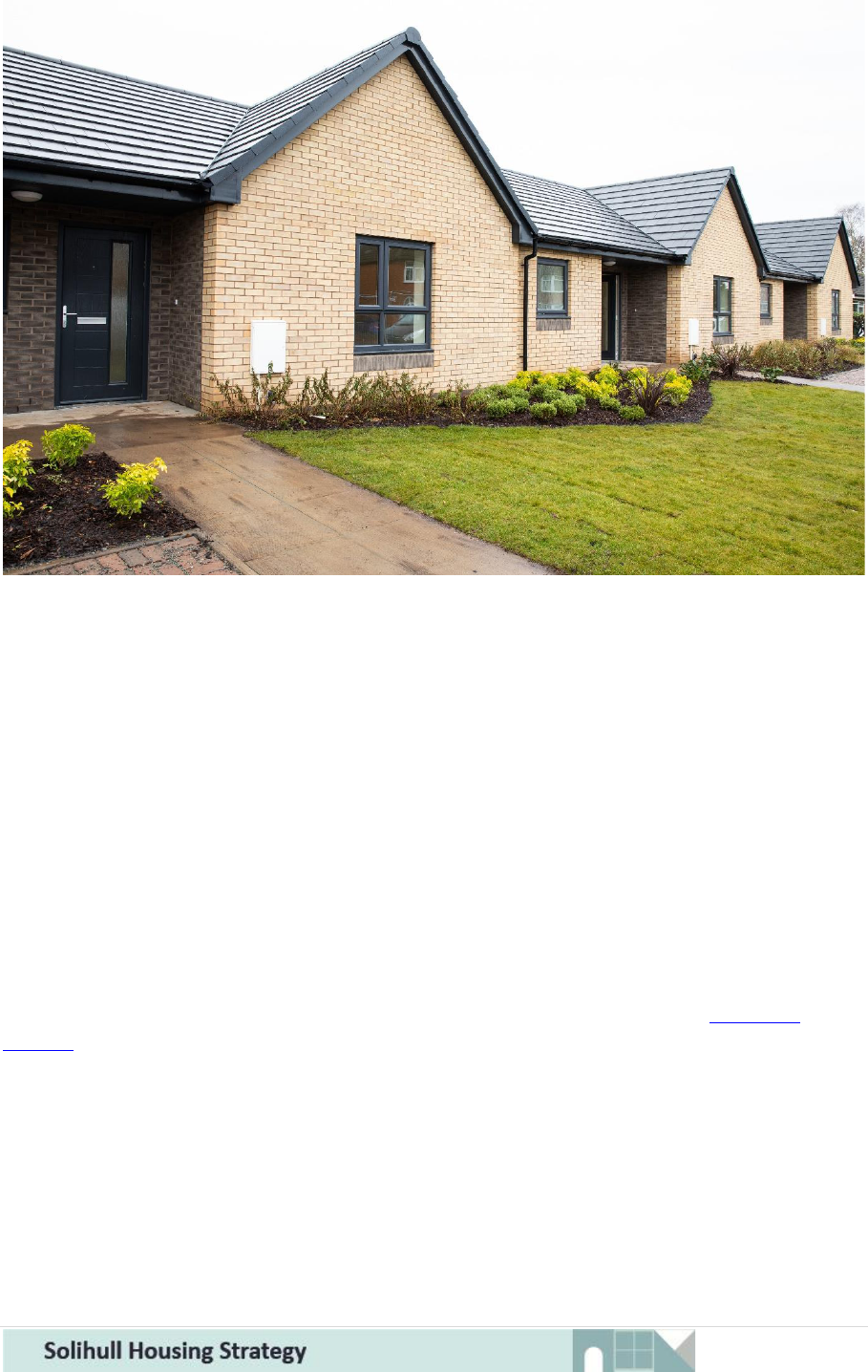
30 | P a g e
6.26 There will be a requirement for more extra care housing and residential and nursing (including
dementia) care bedspaces in the period covered by this Strategy due to the rising population. This
will be delivered in a number of ways,
Directly commissioning extra care and care bedspace provision on Council sites, according to
needs identified through the Market Position Statement. Remodelling of HRA property
through the Asset Management Strategy provides another opportunity to produce new
independent living options. We will work to deliver the housing needs arising from the
Market Position Statement with regard to securing sites, obtaining capital funding and
delivery partners. We will give consideration to the needs of the ‘middle market’ in our
commissioning decisions
Draft Local Plan policy P4E for older and disabled people
Private developers will bring forward planning policy compliant schemes on ‘windfall’
housing sites.
6.27 We recognise the pressure in the recruitment and retention of care staff. Our Workforce
Strategy sets out the approach for tackling this. Housing is not assessed to be a factor in causing this
pressure, but we will keep this under review. Where the provision, or policies relating to housing,
are seen as being able to help address these pressures we will bring forward suitable housing
initiatives.
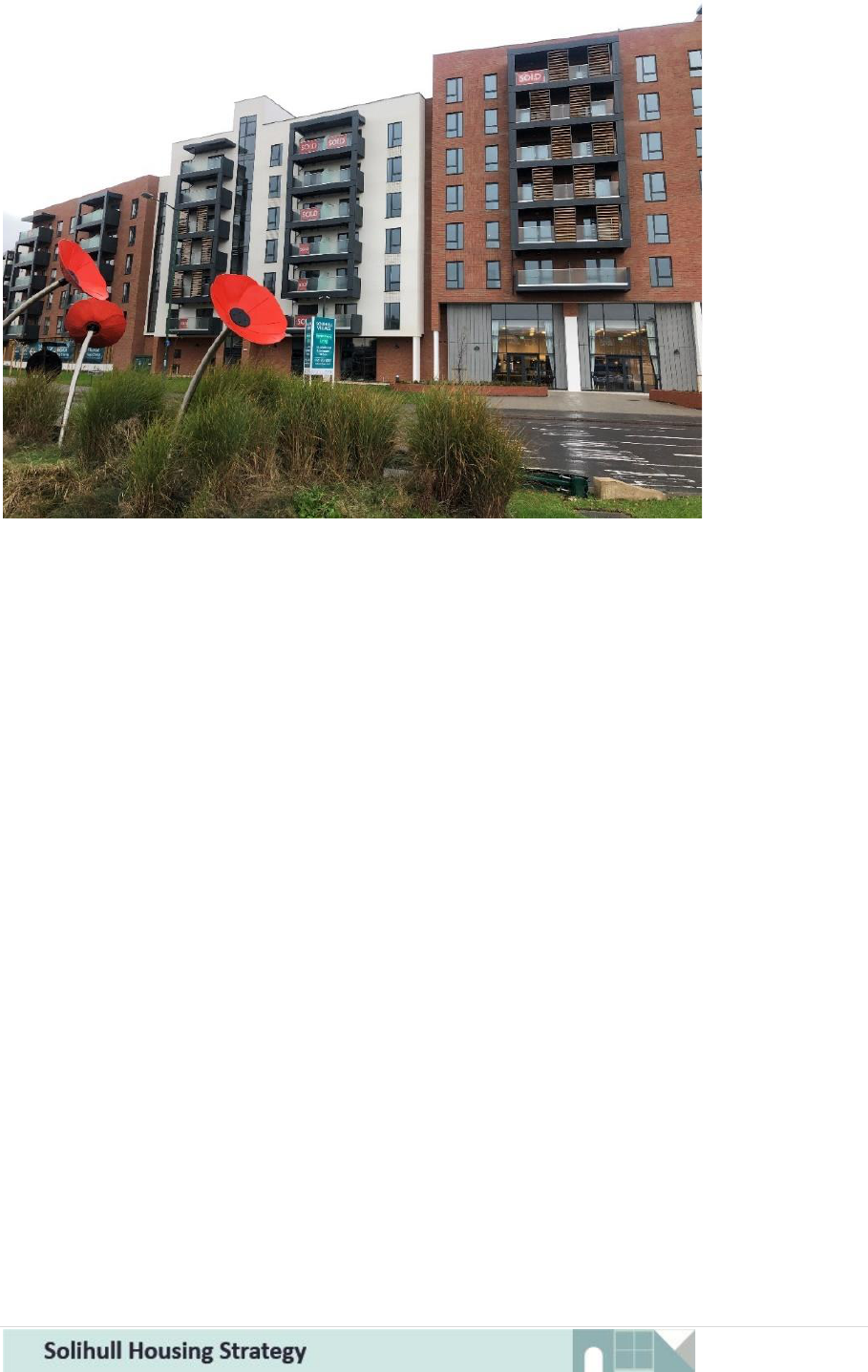
31 | P a g e

32 | P a g e
7. Helping People with Additional Support Needs
Challenges and Opportunities
7.1 A wide range of people can have additional support needs. People may require short-term
support, and some may need longer-term support.
7.2 Helping people effectively is a broad challenge. It involves early identification and prevention
which in turn requires finance, commissioning and building effective partnerships within the Council
and between the Council and a wide range of partners in both the statutory and voluntary sector.
7.3 The challenge is to work to prevent crisis and respond effectively at the point of crisis. The
important opportunity is to deliver good outcomes for people and reduce future service demand.
The effectiveness of the Council’s approach in this area is very significant to the wider Health and
Wellbeing Strategy and Health Inequalities work. For example, housing services, specialist and
supported housing and additional affordable housing and homelessness initiatives helps older and
disabled people and other vulnerable groups including families, children and young people.
7.4 Effective housing management policies, commissioning the right forms of housing with support
and delivering more social rented housing are all important responses to helping people with
additional support needs.
7.5 The landscape around homelessness has changed significantly over recent years with the
introduction of the Homelessness Reduction Act 2017 which broadened the Council’s duties and
placed a greater emphasis on preventing and relieving homelessness. Through these changes the
Council has developed its approach and year on year prevented or relieved homelessness in
increasing numbers of cases, including in over half of all approaches in 2021/22.
7.6 The Council’s response to homelessness and rough sleeping is impacted by existing and newly
arising housing pressures, such as the cost of living, the under-supply of social rented homes and
high market rent levels and limited availability in the private rented sector. Homelessness
approaches have risen significantly in 2022, with 21% more approaches in the first 6 months of the
year than in the same period last year.
7.7 A relatively new development in Solihull is the need to support the resettlement and integration
of large and rapid movements of people from refugee and migrant communities. The number of
people being displaced internationally due to conflict, persecution and natural disasters has more
than doubled since 2011 to 31.7million.
7.8 Solihull is seeing large and supported movements of people from Hong Kong, Afghanistan,
Ukraine, the Middle East and African regions. Over the next few years, it is expected that more than
3,000 people will have arrived and settled in the Borough from these different countries and regions.
Over the longer-term the number of new arrivals is likely to continue to increase as the implications
of climate change are felt globally.
7.9 The UK and local authorities like Solihull, have an important role to play in supporting the
resettlement and relocation of people as they seek to restart and rebuild their lives. Accessing stable
and secure housing, as well as being able to sustain tenancies are a fundamental part of that
resettlement journey and integration into life in the UK.

33 | P a g e
Our Housing Ambition
7.10 We will work to prevent crisis wherever possible. Where crisis does occur, we will respond
effectively.
7.11 We will ensure that people requiring support are able to access housing and support services
when it is needed. We will use our funding, service provision, enabling and enforcement powers to
meet housing needs by promoting independent living, providing supported housing and services and
good quality and well supported emergency and temporary housing solutions.
Low Income Households
7.12 Significantly rising living costs affect the whole population but will be particularly damaging to
lower income households, young people, many lone parents and families with children.
7.13 Our Here2Help initiative provides details of financial help and assistance and information to
help keep people warm, healthy and safe. The reach and effectiveness of this work developed during
the pandemic as deeper and stronger connections were made with local community networks.
7.14 Effective money advice is vital in preventing and tackling crisis. Through our Financial Inclusion
Network, we will continue to promote financial inclusion through money and debt advice delivered
by the Community Wellbeing Service. SCHs Money Advice service will continue to develop and
provide important advice capacity along that provided by Citizens Advice, other social landlords and
third sector organisations.
7.15 We will continue to help people struggling with living costs. Generic housing services have a
very important role through customer contact, understanding and signposting. We will work to
maximise the value of this so that households can be assisted effectively.
7.16 We will also work to ensure that every contact Council officers have - and those from
partnership organisations – counts in helping early identification or a prompt response to crisis.
7.17 The provision of ‘mainstream’ housing management and maintenance services by SCH and
Private Registered Providers is therefore vital. An important part of this is that social landlords have
good knowledge of their customers. For example, SCH have introduced an ‘Inclusive Services
Register’ and will broaden this to create a comprehensive ‘Priority Service Register’. Private
Registered Providers also develop good practice, and we will share innovative approaches with them
so that they can benefit as many people as possible.
7.18 The work identified in this Strategy will help meet the housing needs of low-income households
and those with additional support needs. Households with low and insecure incomes require good
quality homes at affordable rents. Our work to deliver more social rented homes, improve the
sustainability of homes and make best use of the existing social housing stock is fundamental to this.
This provides the essential springboard to helping people to take advantage of opportunities in skills
and training and employment.
Younger Disabled Adults
7.19 The population growth among disabled adults aged 18-64 with disabilities is less pronounced
than among older people but there are increasing numbers of physically disabled adults, adults with
learning difficulties, autistic people and people with long term mental ill health who require
specialist accommodation to support them to live as independently as possible.
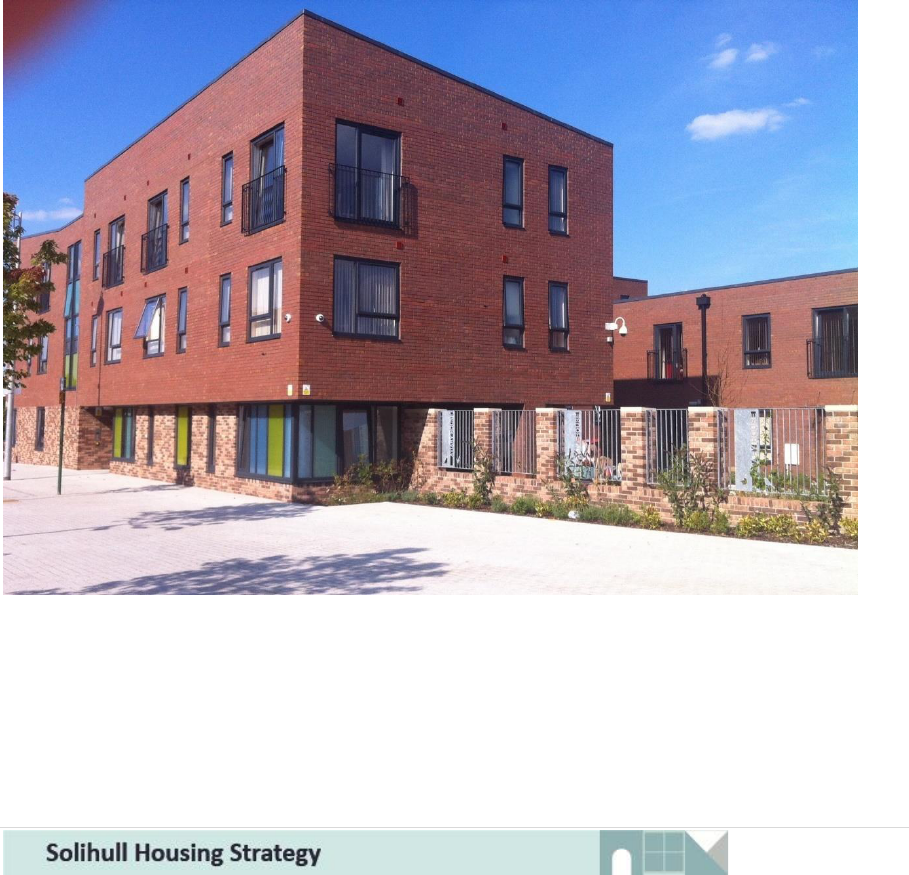
34 | P a g e
7.20 In all circumstances, we will work to ensure disabled people have the same rights to security of
their home, to routine and specialist health care access and opportunities for employment, training,
leisure and fulfilment as a person without a disability.
7.21 The Council supports the ambitions in the White Paper ‘People at the Heart of Care’,
Live as part of a community and well connected to people important to that person
Lead a fulfilling life with access to support, aids and adaptations to maintain and enhance
wellbeing
Enable independent living through necessary adaptions, technology and personal support
A good choice of alternative housing and support options, to enable opportunities to plan
ahead, and take up options in a timely fashion.
7.22 For many disabled adults, their choice and that of their families, will be to continue to live in the
family home and be supported to do so for as long as that is desired and practical. This may include
making adaptations to the home to make it accessible, using Disabled Facilities Grants (where
applicable) to enable this or the equivalent in Council properties. We will aim to extend the use of
Disabled Facilities Grants to support younger adults to live in ordinary accommodation, either with
their families, in a shared property or independently, with adaptations and technology used to the
maximum effect.
7.23 Most supported living provision is commissioned directly by the Council. Care and support are
provided to meet individually assessed Care Act eligible needs and is designed to support
independence. We have worked effectively to avoid hospital and care home use for people with a
learning disability and this has helped create demand for small scale supported living solutions
around the Borough.

35 | P a g e
7.24 The Market Position Statement is the basis for our strategic commissioning decisions, and we
will work to deliver the housing needs arising from this with regard to securing sites, obtaining
capital funding and delivery partners.
7.25 We will work to provide affordable, safe and accessible housing that provides alternatives to
residential care. This could be in individual homes or small supported living developments. Working
with social care commissioners, we will identify the needs for additional development and the site
opportunities to meet these. This is likely to be comparatively small scale affordable rented
provision, built to accessible or adaptable standards.
7.26 Where younger adults experience mental health difficulties, this may be a short-term crisis
during which the security of work, home and family life may be lost and have a damaging impact on
recovery.
7.27 There is a smaller range of provision for people who have mental health support needs, with
limited residential care and housing with support to enable recovery. Mental health crises are less
predictable than the needs of disabled young people, and this makes the planning capacity and
location of accommodation more complex. ‘Step up' accommodation is available when a person's
needs for short term support increase and extra help is required to avoid hospital admission. 'Step
down' provision is used to enable people to return to live in the community after they have
experienced a hospital admission to have mental health needs assessed or treated. We will work to
ensure people can be supported in ordinary or supported tenancies so that people do not remain for
longer than intended in short term provision. Further, use of Disabled Facilities Grants to give access
to facilities within a property are also eligible to those with mental health needs and the Council
supports this use for residents.
7.28 There will continue to be a need to place in specialist care homes a small number of adults with
complex needs or behaviours that require specialist skills to manage or to assess. Residential care
homes will therefore continue to be an option for those with complex needs or for whom supported
living may not provide sufficient levels of 24-hour access to support. Placements will be for as short
a period as possible to enable a planned return to the person's familiar home and community when
appropriate. Hospital care will only be used for people with a learning disability where there is a
clinical need or where a formal detention has been made under the Mental Health Act.
7.29 There remains scope to further develop provision to meet the demand and expectations of
younger adults in transition from children's services who are may be looking to live close to their
families in Solihull. There is interest from providers in developing more, but land and property prices
in the Borough make this challenging. We will continue to assess other initiatives to help deliver
additional housing options for younger adults.
Homelessness and Rough Sleeping
7.30 We have a strong track record of working in partnership to prevent and relieve homelessness,
supported by a strong political and community desire to end rough sleeping, and help people in
need.
7.31 Our Housing Options service is delivered by SCH and is supplemented by a specialist Youth Hub
and pathway for 16 – 25-year-olds without dependents. We ensure that individuals who are, or at
risk of, homelessness and rough sleeping are supported to secure and sustain settled
accommodation through a wide range of partnerships, including commissioned providers who
deliver specialist support to meet local need.

36 | P a g e
7.32 We recognise how damaging becoming homeless can be for individuals and families and will
work to support those who are homeless or at risk of homelessness by:
1. Minimise rough sleeping - we will work to prevent rough sleeping from occurring wherever
possible; and when it does occur, it will be rare, brief and non-recurrent due to the available
interventions and support. We will achieve this through the provision of a Rough Sleeping
Team, a responsive outreach service and bespoke housing and support models recognising
the additional needs rough sleepers may have. These initiatives will work alongside and in
addition to the statutory homeless provision through SCH and St Basils Solihull Youth Hub.
2. Prevent homelessness whenever we can - we will work to keep people in their homes
wherever possible through commissioned partners undertaking targeted case work to
provide personalised advice and assistance to avoid the loss of homes. We will work closely
with partner agencies to increase early identification of issues to maximise the scope for
pre-crisis activity and intervention.
3. Relieve homelessness when it cannot be prevented - we will work to improve access to
social and affordable housing and ensure that we are allocating housing to those who are
most in need. We will also support households to access the private rented sector. For those
who need emergency temporary accommodation, we will continue our work to reduce our
use of hotels and develop alternative temporary accommodation options. We will also work
to reduce the length of stay for households in temporary accommodation.
4. Support people to recover from homelessness - we will continue to develop a targeted
response to vulnerable groups in the borough. We will develop robust pathways and
continue to commission specialist providers to support our vulnerable households, and work
in partnerships with good quality supported housing providers.
5. Connect services at the strategic, policy and operational levels - partnership working is at the
heart of the response to homelessness and rough sleeping in Solihull. We are committed to
continuing to build on partnerships by ensuring that partners are engaged and involved
strategically and operationally.
7.33 During 2023 - 2024, we will review our Homelessness and Rough Sleeper Strategy to
complement and build on this Housing Strategy. The work delivered under this strategy will focus on
emerging priority areas including:
Rough Sleepers – through the creation of a new rough sleeper team we are developing a
new pathway for rough sleepers to ensure we engage effectively through outreach - both
responding to Streetlink reports made by the public and through proactively visiting known
hotspots – and ensuring anyone who is rough sleeping or at risk of rough sleeping is
supported to secure and sustain accommodation. As part of developing this pathway, we
will evaluate the impact of the Housing First pilot and be a part of the Centre for
Homelessness Impact pilot on Ending Rough Sleeping
Domestic abuse – is consistently one of the top reasons for approaches to the Housing
Options service, accounting for nearly 15% of approaches. The new Domestic Abuse Act
2021 has supported local authorities to develop the support available for those experiencing
domestic abuse. We will continue to develop our housing options for those experiencing
domestic abuse, including providing domestic abuse safe accommodation
Veterans – we will ensure that veterans are identified and supported to access housing and
avoid homelessness

37 | P a g e
Private Rented Sector – making best use of this will be a core priority of the new strategy,
ensuring that households are supported to access the private rented sector, landlords are
supported thereby helping to avoid homelessness
Supported Housing – we will continue to work with trusted partners to ensure that we can
access quality, safe, supported housing which provides individuals with the skills and
confidence to sustain a tenancy and live independently
Families – we will review the experience of homeless families and implement initiatives to
better meet their needs, including reducing their length of stay in budget hotels and
temporary accommodation, recognising the adverse impact this can have on families.
Young people – we will continue to work with our Youth Hub provider to develop an offer
that meets the needs of young people. This will include providing access to affordable live-
work accommodation and initiatives to support young people to secure work and transition
out of supported accommodation. We will complete a housing needs assessment around
housing options for young people, understanding the opportunities and barriers. We will
develop our corporate parenting offer to ensure that we are tailoring our response to ensure
that our care experienced young people (who account for 15% youth homelessness
applications) are supported to secure and sustain accommodation
Ex-Offenders – through the development of Solihull’s Reducing Reoffending Strategy we will
review our existing service provision for housing and homelessness in relation to ex-
offenders, assessing the impact of our specialist housing and developing actions to
overcome any barriers currently faced by ex-offenders and those who support them, in
preventing homelessness and accessing housing
Specialist Pathways – we will review our existing pathways and ensure that they deliver the
right support, at the right time, to households who are, or are at risk of homelessness and
rough sleeping.
Armed Forces and Veterans
7.34 We recognise that serving and former members of the Armed Services, and their family
members can be vulnerable and disadvantaged by the requirements of military service and, in
particular, the need to move from base to base. We are committed to ensuring the armed forces
community and their families receive help and support to ensure effective crisis prevention and
relief and a settled home that meets their requirements.
7.35 We will remain committed to supporting people effectively. Solihull Council signed the Armed
Forces Covenant in June 2012. The Armed Forces Act 2021 placed a legal obligation on the Council
and others, when exercising relevant statutory functions, to have due regard to principles of the
Covenant. We will ensure full and effective compliance with the Act in exercising our housing
functions.
7.36 The Council has signed the Veterans Pledges as part of the WMCA Commitment to Collaborate
and has approved detailed actions to implement these pledges.
7.37 Solihull is a member of the Coventry, Solihull and Warwickshire Armed Forces Covenant
Partnership. Through the partnership, there is coordination of work in ensuring that services are
responding holistically to veterans’ needs.

38 | P a g e
7.38 We will,
Promote better outcomes through partnership working
Work in partnership to form better housing pathways for veterans. This will include, for
example, encouraging private landlords to provide tenancies to serving personnel by making
them aware of the MODs Tenancy Deposit Loan Scheme and recognising the priority that ex-
service personnel have for new shared ownership and that any local connection criteria shall
not apply in respect of low cost home ownership opportunities in the Borough.
Engage with service charities, such as the Royal British Legion, when veterans are at risk of
eviction and work pro-actively with other providers to provide assistance to maintain a
tenancy
Promote access to social rented housing in Solihull by exempting from any local connection
requirements divorced or separated spouses or civil partners of Service personnel who need
to move out of accommodation provided by the Ministry of Defence
Expect all Private Registered Providers to promote access by veterans to their properties
through the MOD Referral Scheme
Work with other local authorities and organisations to recognise and promote best practice
for veterans in relation to ‘move on’ support
Administer all mandatory disabled facilities grants effectively
Ensure that our commissioning and contracting of services encourages use of the Covenant.
People from Refugee and Migrant Communities
7.39 As we welcome more new arrivals from refugee and migrant communities, arriving
independently or via Government sponsored resettlement schemes, we need to create and develop
the capacity and infrastructure to enable people to successfully resettle and integrate into life in
Solihull. Fundamental to this and being able to access and sustain education, employment,
community support and networks, is access to affordable and sustainable housing.
7.40 The Council has several different roles to play with respect to housing and people from refugee
and migrant communities. In some circumstances, the Council will be required to source and provide
accommodation to help refugees settle in their first few years in the UK. In other circumstances, the
Council will have a strong interest in ensuring that newly arrived communities are able to
successfully navigate through and access the UK housing market. The Council will also need to
ensure that these communities aren’t exploited in the private rented sector.
7.41 We also want to ensure that people can sustain their tenancies in the private rented sector,
which will be the primary source of accommodation for new arrivals. This is both during the first few
years, whilst the Council provides Government funded resettlement support, as well as more longer-
term as that support reduces and eventually comes to an end. It is through providing tenancy
support, help with household budgeting, navigation through the welfare and tax system that we will
aim to help people sustain their tenancies.
7.42 If the Council and its partners can deliver and achieve these things then we will be able to
prevent and reduce homelessness amongst people from refugee and migrant communities. We will
provide a foundation for new arrivals and their future children to integrate into UK life and make a
positive contribution to the local community and economy.

39 | P a g e
8. Meeting Local Housing Needs through New Development
Challenges and Opportunities
8.1 Government is committed to significantly boosting the supply of housing and local authorities
are required to ensure sufficient land for this. This is a challenge for Solihull where 67% of the
Borough is countryside and Green Belt and nationally and regionally important infrastructure is
accommodated in the form of High Speed 2 and the Interchange station.
8.2 House prices are comparatively high, making it difficult for younger people and other first-time
buyers to purchase in the Borough. The proportionate decrease in home ownership that occurred
between 2001 and 2021 reflects this. High Speed 2 is expected to add to housing demand and bring
added pressures on affordability.
8.3 Housing development overall is determined by the Solihull Local Plan. The draft Plan will see
significant housing development across the Borough. This will include land released from Green Belt
sites, ‘windfall sites’, development at Solihull and Chelmsley Wood Town Centres and the ‘UK
Central Hub’.
8.4 Solihull is an attractive area for development and housing delivery in itself is not a problem. The
challenge for the Council is that the right type of housing is developed to help meet local needs and
thereby achieve the Council’s overall housing vison.
8.5 The Council and other public bodies do not have significant amounts of land that is available for
residential development. Sites in the Council’s control are often complex and difficult to bring
forward for development.
8.6 Sites coming forward for residential development are usually privately owned and most housing
delivery in the Borough is by developers building for open market sale. Land for residential
development in Solihull is expensive and this makes it very difficult for the Council or a housing
association to purchase land. It is therefore important that planning policies help to shape good
outcomes from market-led development.
8.7 An important source of affordable housing is from the application of planning policy (‘Section
106’) on private development sites. Proposed legislative changes to abolish Section 106 agreements
and replace them with an Infrastructure Levy is important. Government is committed to there being
no loss in the amount of affordable housing being delivered but the changes proposed present a
potential challenge to affordable housing delivery.
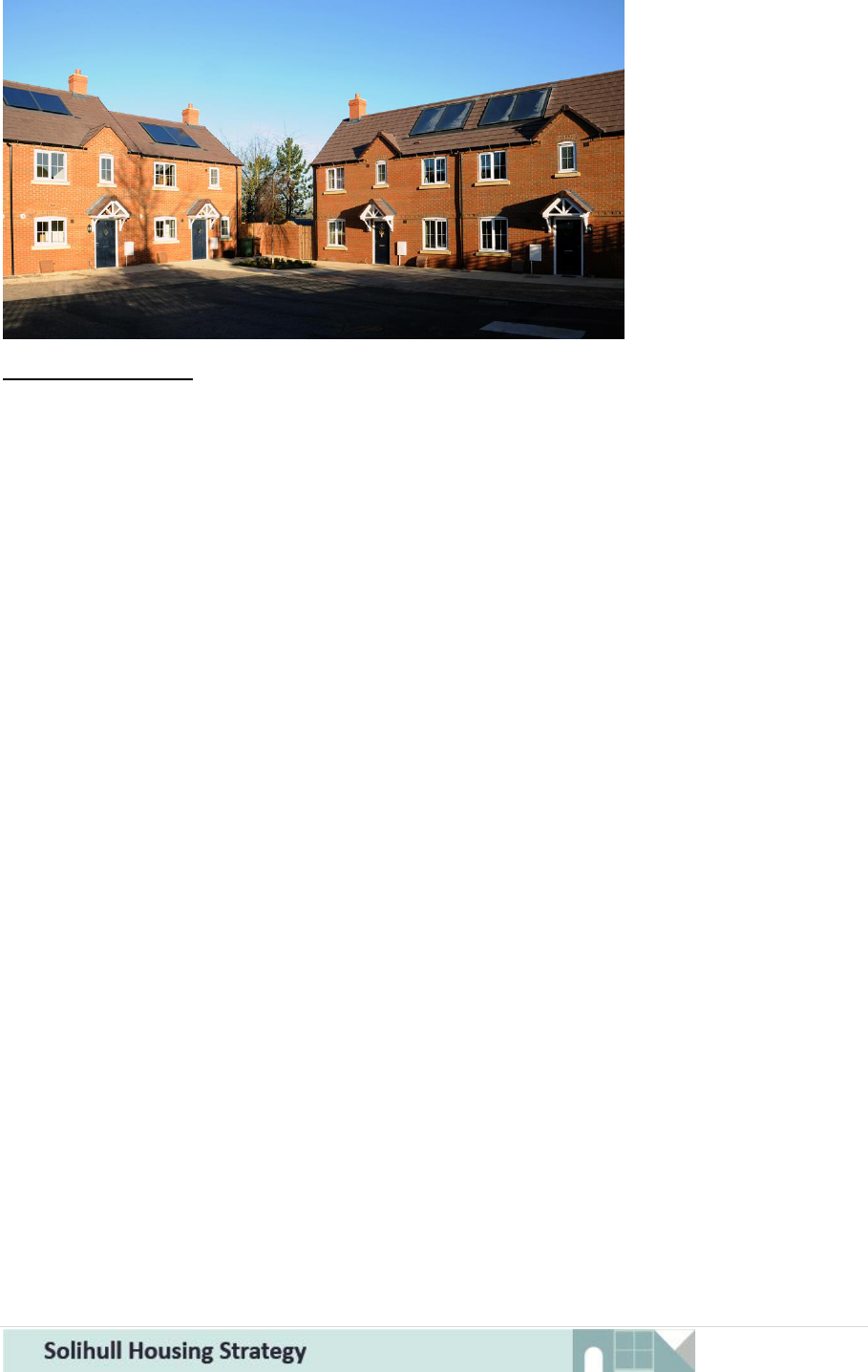
40 | P a g e
Our Housing Ambition
8.8 We will work to accelerate housing delivery, promote sustainable development and housing
quality, meet housing need and improve the affordability of housing. This will help to provide a
better balanced and more diverse housing market in Solihull.
8.9 This will support the local economy and promote improved housing pathways across the
different life-stages. This will not only help first time buyers, and other newly forming households.
Development that meets local housing needs will also provide improved housing choice for older
households wanting to ‘downsize’.
8.10 Our ambition is shared with Homes England who are committed to driving the affordable
housing growth agenda We will collaborate effectively with Homes England to make sure more
homes are built to meet need.
8.11 We will accelerate privately-led housing delivery in the following ways,
Securing the adoption of the Solihull Local Plan
Responding effectively to all pre-application and planning applications
Responding flexibly to any stalled developments to ensure early commencement and
completion.
8.12 We will adopt a brownfield first approach, making best use of the existing urban fabric close to
existing transport links and services. This will reduce the need for additional travel and help support
sustainable transport demand.
8.13 We will deliver all Council owned housing sites effectively. For development sites where the
Council is the landowner, an Accelerated Housing Programme has been established. These are
strategically significant and complex sites and are taken forward in close collaboration with the
WMCA who may provide financial assistance to help develop detailed business cases.
8.14 We will co-ordinate and advise on the need and the potential for specialist housing provision on
larger site opportunities, helping to effectively connect housing growth and development of housing
for older people and younger adults with disabilities.
8.15 Small Council General Fund sites come forward for redevelopment. These will typically arise
from Council buildings which are no longer needed in their current use. Where the land is suitable

41 | P a g e
for housing, first consideration will be given as to whether it could be developed directly by the
Council for affordable housing.
8.16 We will work to enable a wide range of housing provision that meets our local housing needs. A
range of policies in the draft Local Plan will help do this.
8.17 Solihull’s high house prices can mean that even arrangements such as shared ownership and
discounted market can still be unaffordable at the local level. Initiatives to help people onto the
housing ladder in a way that is affordable and sustainable are very important. We will monitor and
assess those approaches that are likely to have the most benefit in different areas of the Borough.
8.18 We will promote opportunities for low-cost home ownership by,
Supporting direct delivery by Registered Providers of shared ownership housing
Requiring shared ownership and/or First Homes under planning agreements on private-led
sites (Local Plan policy P4A)
Supporting low-cost home ownership developed under ‘Rural Exceptions’ (Local Plan policy
P4B) thereby helping Parish Council’s and Neighbourhood Plan areas to deliver additional
affordable housing in their areas.
Supporting Registered Providers to secure low-cost homes additional to the requirements of
policy P4A, in agreement with developers and Homes England
Supporting direct delivery of low-cost home ownership housing by SCH on Council land
Working with our partners to assess new innovative schemes and the contribution they can
make in Solihull.
8.19 Solihull has seen a long-term net loss of social rented housing, although recent years have seen
this trend reversed with small year-on-year increases in the number of social rented homes being
achieved. We want to increase the net number of social rented homes in both Council and housing
association ownership. We will do this by,
Requiring social rented housing under planning agreements on private-led sites (Local Plan
policy P4A)
Supporting direct delivery by SCH on behalf of the Council and housing associations of social
rented housing
Supporting social rented housing developed under ‘Rural Exceptions’ (Local Plan policy P4B)
thereby helping Parish Council’s and Neighbourhood Plan areas to deliver additional
affordable housing in their areas.
Redeveloping older or poorly performing Council housing land to secure a net increase of
social rented homes built to modern standards
Redeveloping Council-owned garage sites to provide new social rented housing
Acquiring properties for sale on the open market and reproviding them at social rents
Converting existing Council housing to create additional homes.
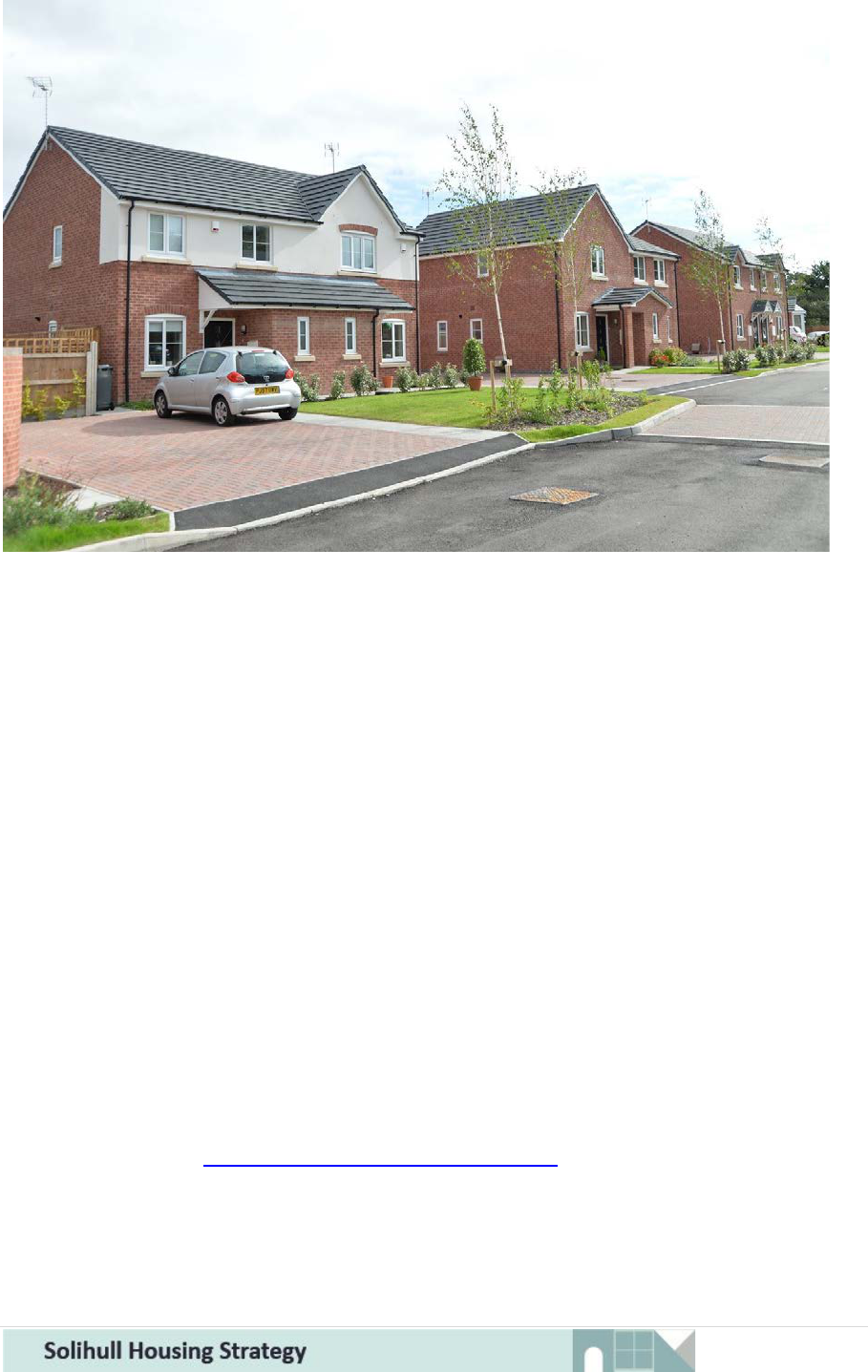
42 | P a g e
8.20 Solihull has not yet seen any Build to Rent development. We consider that it can play an
important role and will support Build to Rent proposals in suitable locations, such as town centres,
requiring that 20% are provided as affordable private rents. This can help to support our towns and
local centres and the housing needs of local people working in the care, retail and hospitality sector.
We will encourage institutional investment approaches to bring forward appropriate schemes.
8.21 We have responded effectively to the Self-build and Custom Housebuilding Act and the
provisions of the ‘right to build’ in the Housing and Planning Act.
8.22 We will provide self-build plots through draft Local Plan policy P4D and consider the need for
additional provision as a part of decision-making on Council land disposals, and in reviews of the
Local Plan.
8.23 Community-led housing can promote community resilience and cohesion, tackle loneliness,
provide affordable accommodation and give residents of all ages real influence over their homes.
We will work with partners to provide support and guidance for groups, including help to seek grant
and loan funding to develop community-led housing.
8.24 We will work to enable local communities to build homes to meet their own needs through
Neighbourhood Planning and our Rural Exception Policy. Proposals that come from the community
that can deliver affordable homes in addition to our established delivery mechanisms will be
supported.
8.25 We will work with West Midlands Urban Community Homes to help enable community led
housing proposals. We will support and enable local voluntary sector organisations, almshouses and
other charities, parish councils and groups of residents who want to come together to help bring
homes to their community that are planned in partnership with local people and influence place
making.

43 | P a g e
9. Implementing the Housing Strategy
Governance
9.1 Responsibility for Housing Strategy is one of the primary responsibilities of the Council’s Cabinet
Member for Climate Change, Planning and Housing. The Council’s Economic Development and
Managed Growth Scrutiny Board provides overview and scrutiny of the responsibilities of this
portfolio.
9.2 Other Cabinet Member portfolios have responsibilities for the different elements of work
covered by the Housing Strategy. The close relationship of many strategic housing matters to a wide
range of Council plans and strategies means that the Council’s Cabinet approves the Housing
Strategy.
9.3 The Strategic Housing Board oversees the development of housing policies, ensuring that they
are consistent with the Council’s wider responsibilities. The Board finalises housing plans and
policies before they are considered for approval by Cabinet or a Cabinet Member.
Delivery
9.4 The wide range of work streams that form this Strategy will be taken forward through several
individual policies, plans and strategies both across the Council and our partner organisations.
9.5 The Implementation Plan sets out targeted interventions and directed activity with shorter-term
targets that we will work on in the period 2023 - 2025. It will be regularly reviewed to take account
of developments at a local, regional, and national level.
9.6 The Implementation Plan does not include all housing activity and every element of the Council’s
strategic approach. Much of the work to implement this Strategy is already part of our ‘business as
usual’ approach or within the governance of other strategies and boards.
9.7 The Strategic Housing Board is responsible for and monitors delivery. The Board will establish
Task and Finish Groups to take forward specific initiatives in the Implementation Plan and will agree
appropriate terms of reference and timescales.
9.8 The Council’s Housing Team will be responsible for the coordination and management of the
Strategy and overseeing the activity contained within it. We will regularly review and provide an up-
to-date Implementation Plan on the Council’s web site and welcome comments during its
implementation at any time.
Partnerships
9.9 Partnership working is at the heart of the development and delivery of this Housing Strategy.
Partnership brings greater insight and expertise, sharing of resources and risks. We have established
a wide range of effective partnerships that serve both to increase overall resources for investment
and the quality of this investment. Resources do not only include the public capital investment that
is available to the Council and other public sector bodies. Private investment and resources provided
through the private sector and voluntary and community and social enterprise are also very
important in helping to deliver the Strategy.

44 | P a g e
9.10 At all times we will be keen to learn and understand the views of all partners and stakeholders
and consider how best to amend our approaches accordingly. We also welcome approaches from all
those with an interest in any part of this Strategy and who can assist with its implementation.

45 | P a g e
Appendix
1. Jargon Buster
Supporting Documents
1. Implementation Plan, 2023 - 2025
2. Health Equalities Assessment Tool
3. Housing Data Dashboard
4. Fair Treatment Assessment

46 | P a g e
Appendix 1 - Jargon Buster
Accessible and Adaptable Housing – Construction or modification of housing to enable independent
living for persons with disabilities. Defined in Part M of Building Regulations (‘M4(2)’ and ‘M4(3)’).
Affordable Housing - Social rent, affordable rent and intermediate housing (e.g., shared ownership;
below market rent) provided to specified eligible households whose needs are not met by the
market.
Affordable Private Rent - set at a level that is at least 20% less than the private market rent (inclusive
of service charges) for the same or equivalent property – see ‘Build to Rent’.
Article 4 - An ‘Article 4’ policy means that a planning application is required for any change of use
from a house (planning ‘C3’ use class) to a small HMO (‘C4’ use class).
Assistive Technology and Telecare (ATT) – Comprises telecare and assistive technology and a mobile
24-hour emergency response to people’s homes.
Authority Monitoring Report – Required by law. Reviews performance against a council’s planning
policies.
Birmingham and Black Country Housing Market Area – Solihull and Birmingham, Bromsgrove,
Cannock Chase, Dudley, Lichfield, North Warwickshire, Redditch, Sandwell, South Staffordshire,
Stratford upon Avon, Tamworth, Walsall and Wolverhampton
Build to Rent – Purpose-built housing normally professionally managed in single ownership and
management control. Defined in paragraphs 003 – 011 of the National Planning Policy Guidance.
Required to make an affordable housing contribution of 20% in accordance with paragraph 002. This
is called Affordable Private Rent.
Community Led Housing – This can include a wide-range of potential arrangements including
community land trusts, community self-build, development trusts, housing co-operatives and self-
help housing.
Community Wellbeing Service - Council commissioned service and delivered by a consortium led by
Age UK Solihull.
Compulsory Purchase Order - A legal function which allows local authorities to obtain land or
property without the consent of the owner.
Decent Homes Standard – First introduced in 2004, the Standard was based on social rented homes
being warm and weatherproof with reasonably modern facilities. The Standard is currently (2022)
under review with proposals that it be extended to the private rented sector.
Disabled Facilities Grant - Council grant to help towards the cost of adapting homes for people with
disabilities.
Discounted Market – A form of low-cost home ownership that helps people purchase a property
below open market value.
Energy Company Obligation (ECO) - ECO is an obligation placed on the larger energy suppliers to
improve energy efficiency of homes.

47 | P a g e
Empty Home - A property that is empty for 6 months or more. A long-term empty property is one
that is empty for 2 years or more.
Energy Performance Certificate – A property rating for energy efficiency. Ratings go from A (most
efficient) to G (least efficient) and are valid for 10 years.
Extra Care - Purpose-built or adapted flats or bungalows with a medium to high level of care
available if required, through an onsite care agency registered through the Care Quality Commission
(CQC). Residents are able to live independently with 24-hour access to support services and staff,
and meals are also available. There are often extensive communal areas, such as space to socialise or
a wellbeing centre.
First Homes – A specific kind of discounted market sale housing. New build homes sold with a
minimum 30% discount off the market price in perpetuity.
Fixed Term tenancies (also called ‘Flexible Tenancies’). At the end of the fixed term the tenancy is
either renewed or terminates.
Future Homes Standard – New build homes will have to meet this standard from 2025. The Standard
means that homes will be ‘zero-carbon ready’.
House in Multiple Occupation - Properties let to 3 or more tenants who form 2 or more households
with shared facilities (e.g. kitchen). Larger houses in multiple occupation, those occupied by 5 or
more people in 2 or more households who share facilities such as a kitchen or bathroom, must be
licensed by the local council.
Homes England – An executive non-departmental public body. Sponsored by the Department for
Levelling Up, Housing and Communities. Provides funds for new affordable housing and aims to
accelerate housing delivery.
Housing Allocation Scheme – Council scheme for determining priorities and for defining the
procedures to be followed in allocating housing accommodation.
Housing Associations - Not for profit organisations providing affordable housing and which are
regulated by the Regulator for Social Housing. Also known as Private Registered Providers.
Housing Revenue Account – The ‘landlord’ account to record expenditure and income on running a
council’s own housing stock and closely related services or facilities, which are provided primarily for
the benefit of the council’s own tenants.
Home Upgrade Grant - Supports low-income households with upgrades to the worst-performing off-
gas-grid homes to create warmer homes at lower cost and support low-income families with the
switch to low-carbon heating.
Integrated Care Board – Integrated Care Systems are partnerships of organisations that come
together to plan and deliver joined up health and care services. They bring together local NHS,
councils and voluntary, community and faith sector. An Integrated Care Board is a statutory NHS
organisation responsible for developing a plan for meeting the health needs of the Birmingham and
Solihull population, managing the NHS budget and arranging for the provision of health services in
the Integrated Care area. NHS Birmingham and Solihull ICB
Intermediate Tenure - Describes a range of homes for sale and rent provided at a cost above social
rent, but below market levels subject to the criteria in the National Planning Policy Framework’s

48 | P a g e
affordable housing definition. These can include shared equity (shared ownership and equity loans),
and intermediate rent.
Low income low energy efficiency (LILLEE) – The current fuel poverty metric based on an EPC of ‘D‘or
below and lower than average income.
Low-cost home ownership – Umbrella term covering a range of schemes that help buyers to
purchase a new home for less than the market value.
Major Development sites – Defined by the National Planning Policy Framework as housing
development where 10 or more homes will be provided, or the site has an area of 0.5 hectares or
more
Midland Landlord Accreditation Scheme - MLAS is a scheme which aims to recognise and promote
good quality safe accommodation. It ensures that landlords have and maintain a good level of
knowledge and practice.
Minor Works - Assists people to obtain minor adaptations and assistive equipment. Examples
include ramps, handrails and grab rails, over bath showers and lever taps.
MoD Referral Scheme – Coordinated by the Joint Service Housing Advice Office (JSHAO) and
available to veterans across the UK. Provides for participating eligible personnel to be nominated by
the JSHAO for assistance in accessing housing association properties, where such personnel would
be unlikely to be afforded a high enough priority to stand a realistic chance of accessing local
authority housing (on account of being (for example) single or childless.
National Space Standards – The national minimum space standard deals with internal space within
new dwellings and is suitable for application across all tenures. The Standards must be introduced
through the planning system by including a policy in a local plan.
National Planning Policy Framework - Sets out Government's economic, environmental and social
planning policies for England. The policies set out in the Framework apply to the preparation of local
plans and to decisions on planning applications.
National Planning Policy Guidance – Provides planning practice guidance within the Framework and
how planning policies are expected to be applied.
Registered Provider – Providers registered with the Regulator of Social Housing. Housing
associations are Private Registered Providers and local authorities Registered Providers.
Regulator of Social Housing – The Government social housing ‘watchdog’.
Retrofitting – Work to improve the energy efficiency of buildings. This can include measures such as
External Wall Insulation, cavity wall insulation, loft insulation and draught-proofing.
Rural Exception sites - Small sites used for affordable housing in perpetuity where sites would not
normally be used for housing. Rural exception sites seek to address the needs of the local
community by accommodating households who are either current residents or have an existing
family or employment connection.
Safe and Sound – Council/SCH service that provides support to help older, disabled and vulnerable
people to live independently in their own homes. It is built on a community/pendant alarm which
enables people to summon help/support.

49 | P a g e
Secure Tenancies - Defined by Part IV of the Housing Act 1985. A secure tenant is entitled to remain
a tenant unless a court order for possession is made against them. To gain possession of a secure
tenancy, the landlord must prove one or more statutory grounds.
Shared Ownership - Where a person buys part of the value of a house from a housing association
and pays rent on the other part.
Solihull Climate Change Commission - provides independent, cross sector and cross-party advice to
the Council.
Solihull Community Housing (SCH) - an Arm’s Length Management Organisation (ALMO) established
in 2004 to manage housing services on behalf of Solihull Council. It is a limited company with one
shareholder, which is Solihull Council.
Solihull Place Committee – A sub-committee of the NHS Birmingham and Solihull Integrated Care
Board
Specialist Housing – Defined in National Planning Policy Guidance ‘Housing for Older and Disabled
People’ and includes ‘sheltered housing’, ‘extra care’ and ‘residential and nursing care’
Strategic Housing Board – Officer group comprising senior officers from each Council Directorate,
and the Chief Executive of SCH. Chaired by the Director of Economy and Infrastructure.
Supported Exempt Accommodation – Introduced into Housing Benefit regulations in January 1996.
To be ‘Exempt’, a provider must obtain exempt status. This requires that the provider is ‘not-for-
profit’ and care, support or supervision is given. This must be more than ‘minimal’.
Tenancy Deposit Loan Scheme – Introduced by the MOD in 2015 and allows an advance of salary to
serving personnel to fund the cost of a private rented tenancy deposit.
Tenancy Strategy - The Localism Act 2011 requires local authorities to develop a Tenancy Strategy to
guide Private Registered Providers in developing tenancy policies for their own stock and it also
requires them to have regard to the strategy.
UK Central Hub – The Hub in Solihull is the location of the High Speed 2 Interchange Station. The Hub
is home to key stakeholders, including the world-class combination of the NEC, Birmingham Airport,
Birmingham International Station, Jaguar Land Rover and Birmingham Business Park, as well as the
340-acre Arden Cross development site, which will host the High Speed 2 Interchange Station,
business, leisure and residential uses.
Underoccupation - A household living in a home with more bedrooms than they need, as defined by
the Council’s Housing Allocation Scheme.
Urban Growth Company - Supported by Solihull Council and the WMCA. The UGC’s main aim is to
unlock the potential of The Hub using a set of place-making principles to deliver a comprehensive
Hub Growth and Infrastructure Plan (HGIP).
Veterans - Anyone who has served for at least one day in Her Majesty’s Armed Forces (Regular or
Reserve), or Merchant Mariners who have seen duty on legally defined military operations.
Windfall - Sites which have not been specifically identified as available in the Local Plan process.
They normally comprise previously developed sites that have unexpectedly become available.

Solihull Council
Economy & Infrastructure Directorate
Council House
Manor Square
Solihull
B91 3QB
E: housingstra[email protected].uk
